National Action: The new parents and the neo-Nazi terror threat
- Published
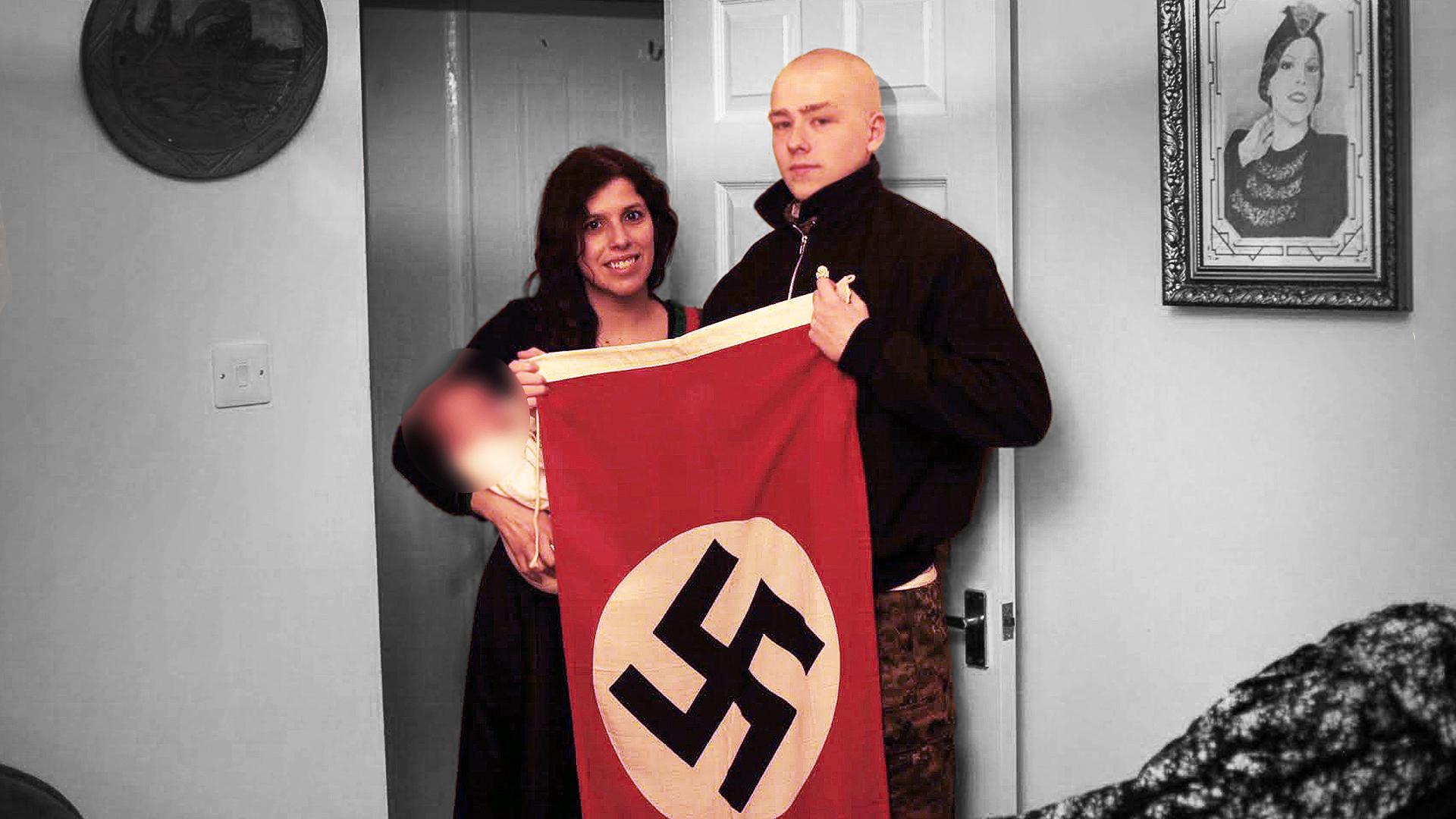
Three people have been convicted of belonging to the banned neo-Nazi group National Action. Adam Thomas, 22, and his partner Claudia Patatas, 38, were found guilty with Daniel Bogunovic, 27, of being members of the far-right group - which was proscribed under anti-terror laws after it celebrated the murder of Labour MP Jo Cox.
UPDATE 18 December 2018: Thomas and Patatas have been sentenced to six-and-a-half years and five years in prison respectively, and Bogunovic to six years and four months. Three other men who pleaded guilty earlier in the case were also jailed.
Here is the story of National Action and the threat posed by its members.

It appeared to be a normal home.
The property, in a quiet part of an Oxfordshire town, was occupied by a couple who had just welcomed their first child into the world.
Neighbours sometimes saw the pair taking their baby out in a pram.
The male, who often dressed in combat trousers, worked as a security guard. The woman - a part-time wedding photographer - had, until recently, worked in a clothes shop.
But inside their house Adam Thomas and his Portuguese partner Claudia Patatas had created a disturbing world.
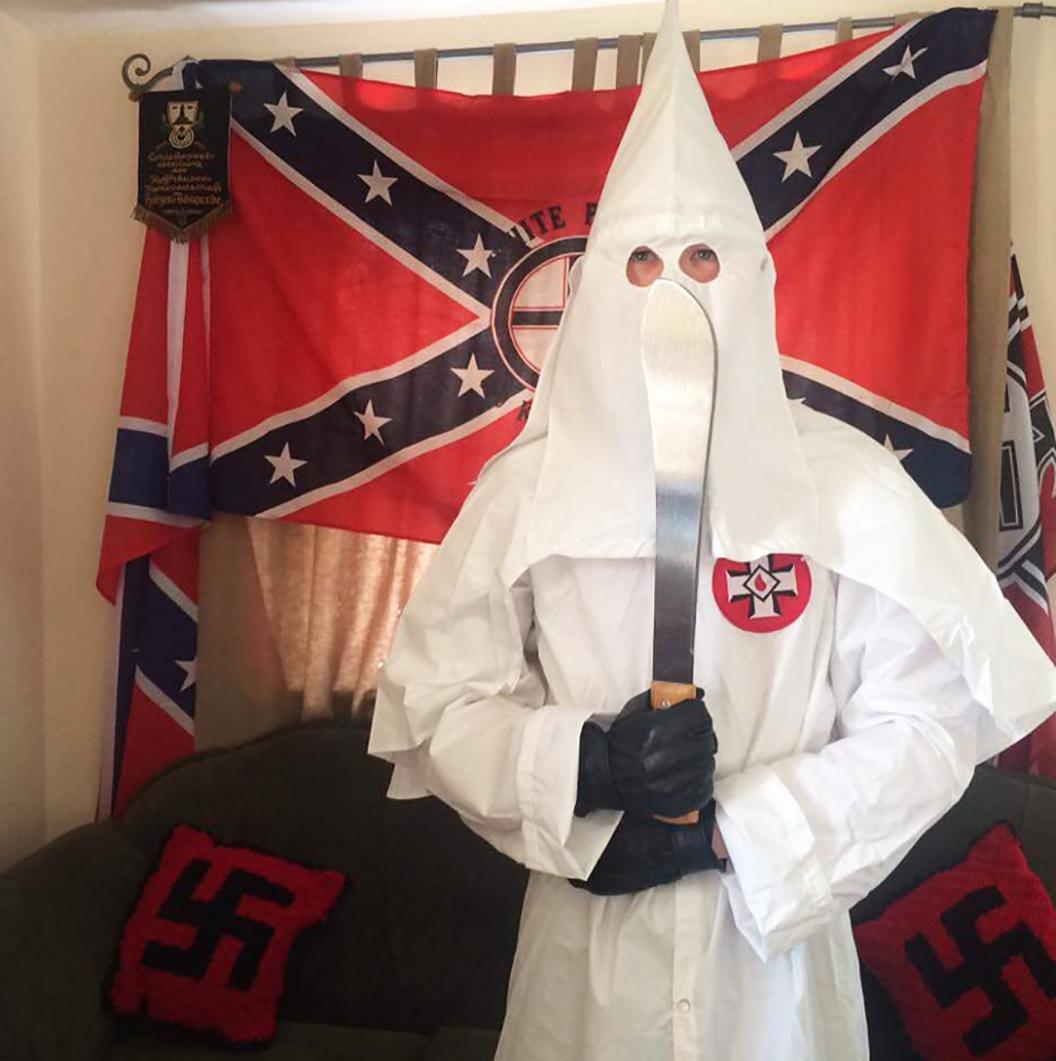
Adam Thomas
Their bedroom was strewn with weapons - machetes, crossbows, an axe under the bed, a Nazi-style dagger.
In the hallway were pendants bearing a black sun - a symbol associated with the SS and the occult - and the insignia of the Ku Klux Klan. Cushions emblazoned with swastikas decorated the lounge. In the kitchen, there was a swastika-shaped pastry cutter.
The fridge was adorned with a poster by the banned neo-Nazi group National Action, declaring 'Britain is ours - the rest must go'.
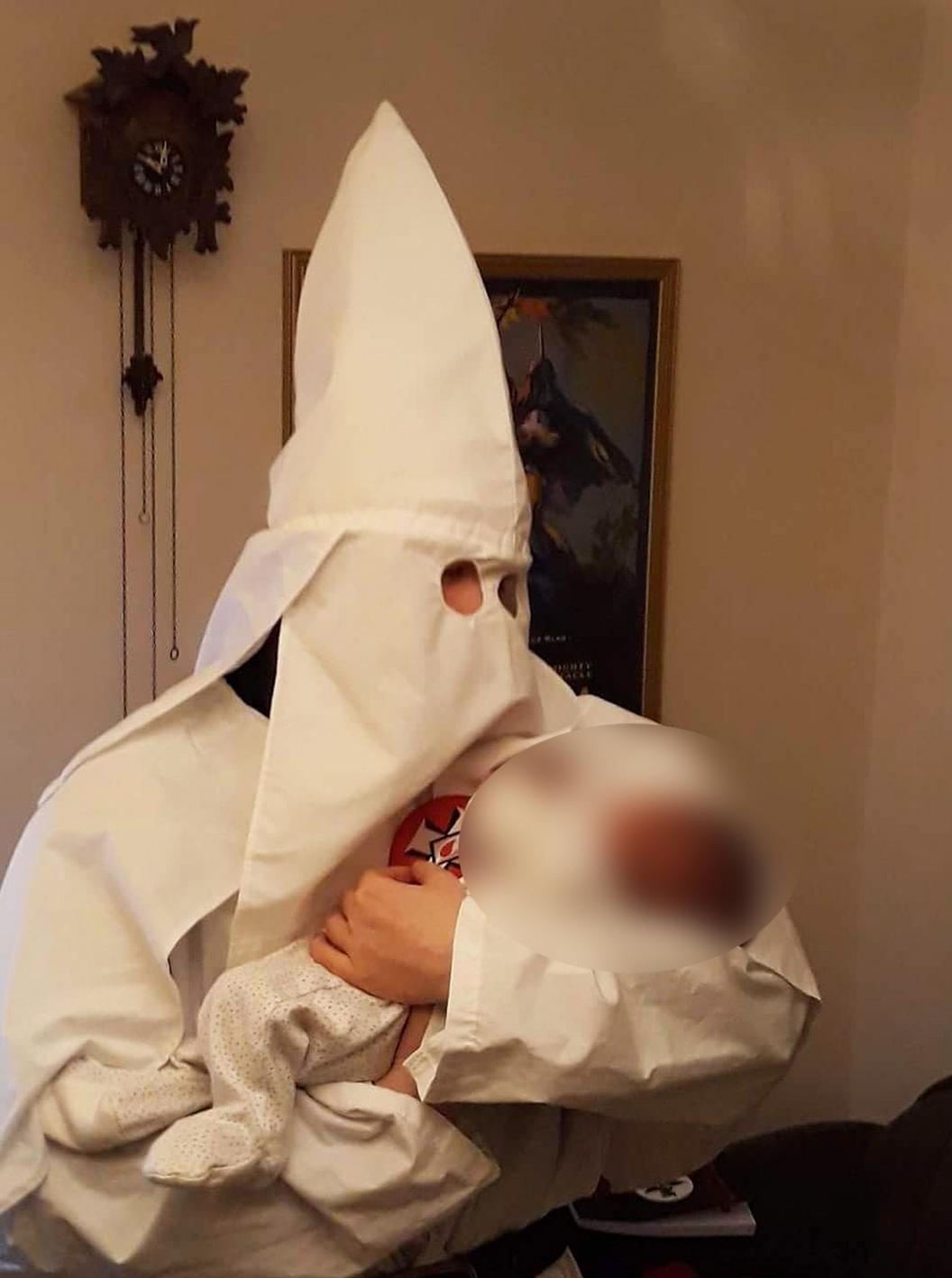
Adam Thomas with his son
A memory card hidden beneath a floorboard under the dining table contained several startling photographs of the couple.
In one, Thomas holds the flag of Nazi Germany while Patatas cradles their baby. In another, mother and baby are with a different man, Darren Fletcher, who performs a Nazi salute while both adults hold the flag.
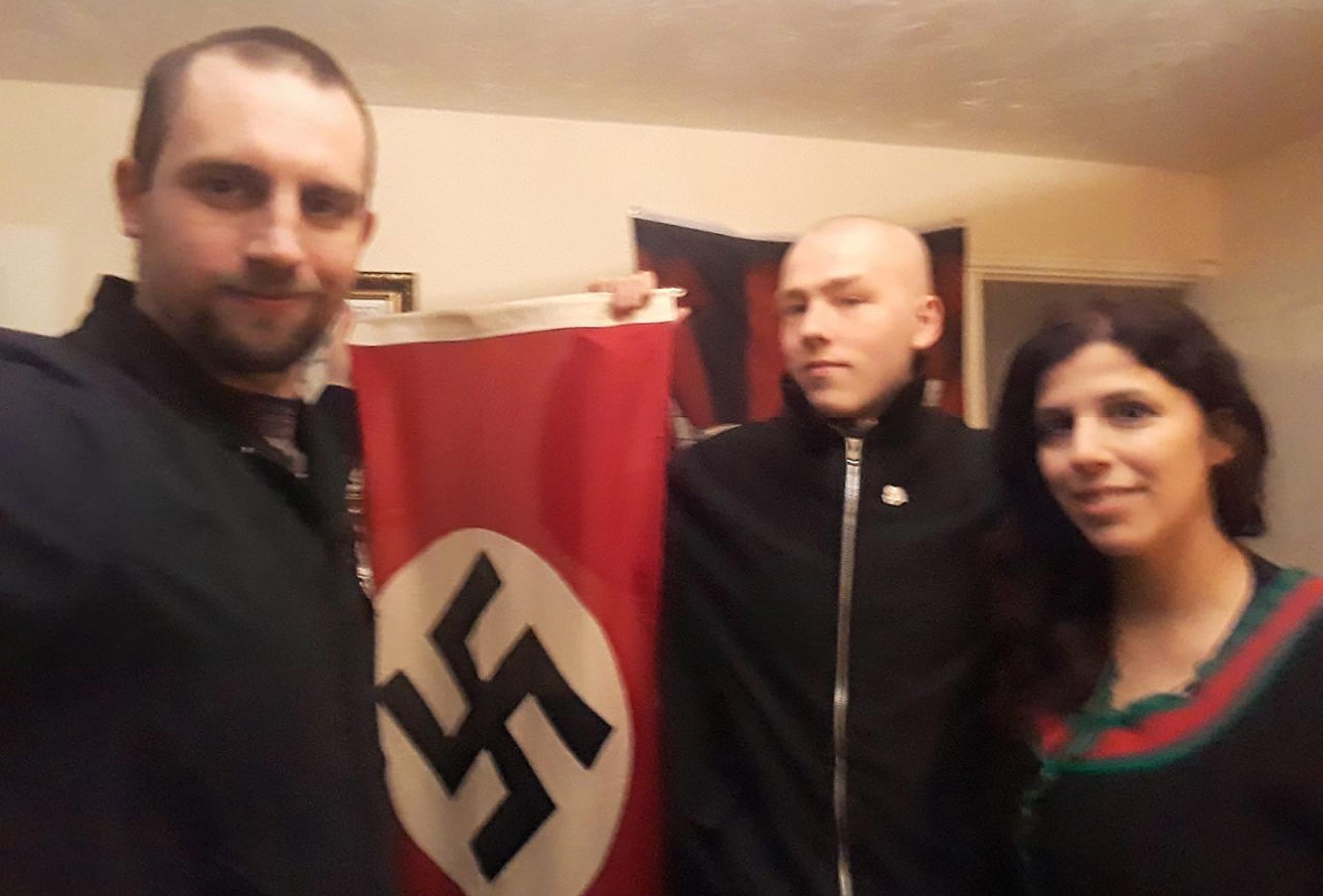
Darren Fletcher, Adam Thomas and Claudia Patatas
Other images found on a mobile phone show Thomas dressed in the distinctive white costume of the KKK, looking down at his son through the eyeholes of a white, peaked hood.
The baby, a little over a month old at the time, had been given the middle name Adolf by his parents - in tribute to the leader of Nazi Germany.
The pictures were found by counter terrorism detectives who arrived at the property early in the morning of 3 January this year to arrest Thomas and Patatas for membership of National Action - a group that had been banned under terrorism legislation in December 2016.

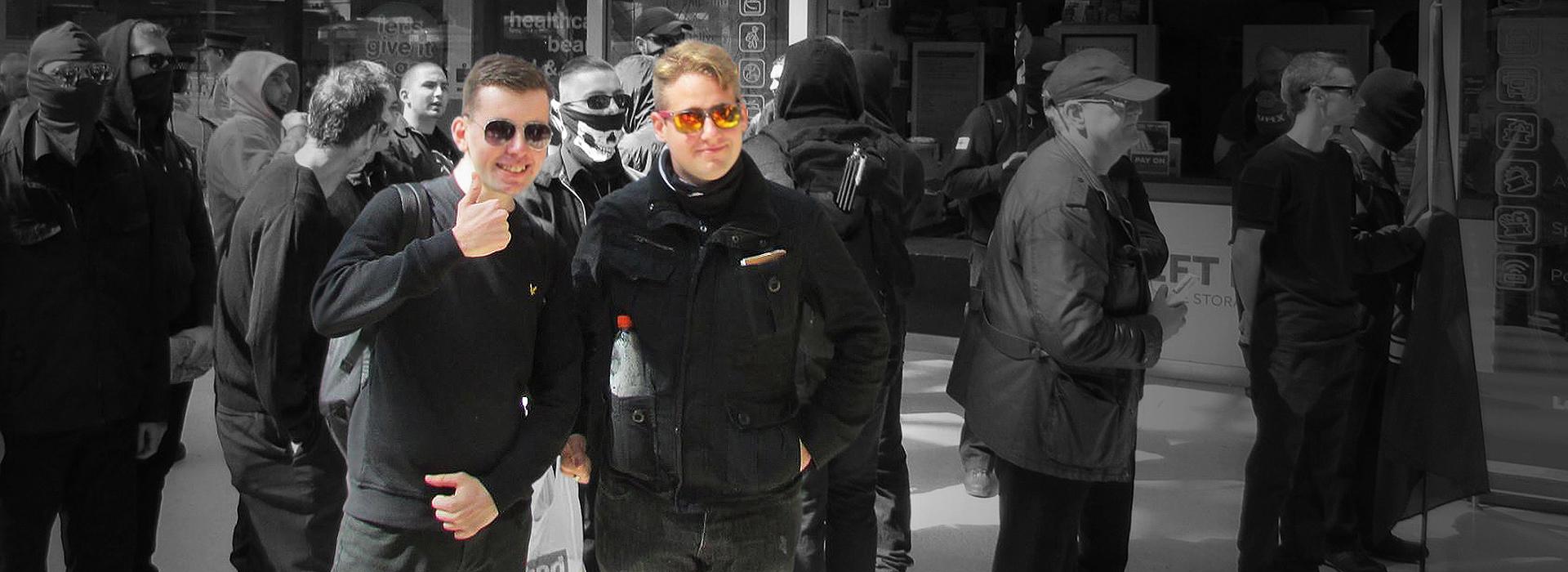
Alex Davies (l) and Ben Raymond
National Action was founded in 2013 by Ben Raymond, now 29, and Alex Davies, now 24.
At the time, Raymond, a recent politics graduate from the University of Essex and avowed neo-Nazi, was living in Bognor Regis. After university, he had drifted into a job as a double-glazing salesman and would go on to work at a job centre, assisting claimants.
Much of his free time was spent online immersed in disturbing extreme right-wing content. He designed memes, edited videos, and wrote long diatribes, including for the obscure Integralist Party, which was seeking a "nationwide fascist army" for its "racial religion that inspires and demands fanaticism".
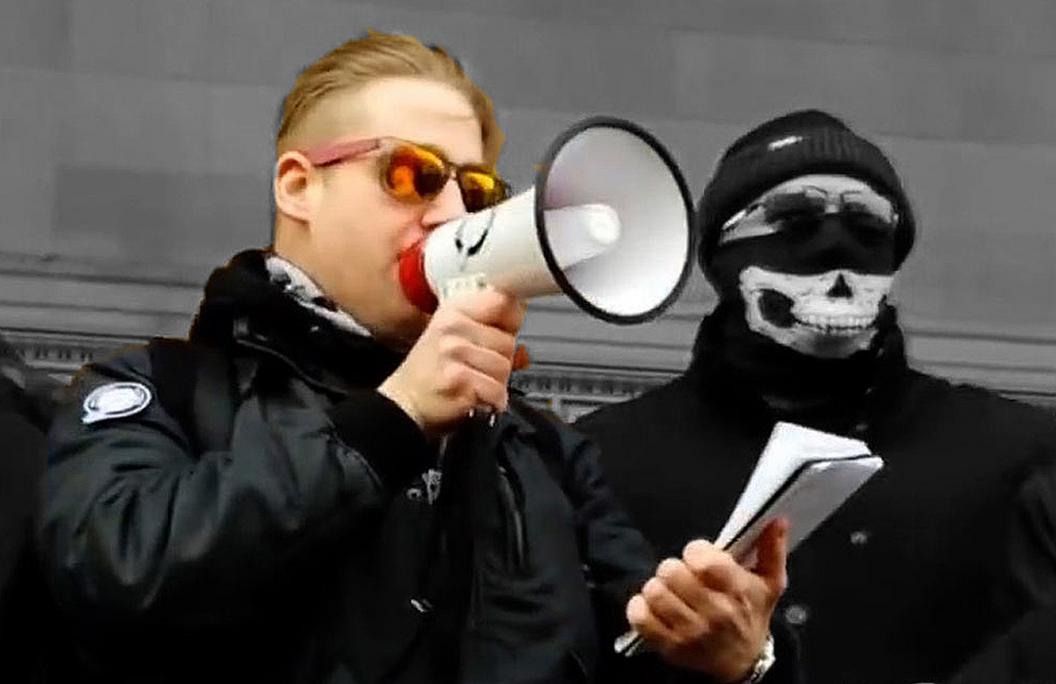
Ben Raymond
It was that online activity that first attracted Davies, a University of Warwick student from Carmarthen and member of the British National Party. By then, the party was in steep decline from its best ever performance in European elections four years earlier.
The pair believed that, in recent years, British far-right organisations had diluted their message by seeking to appeal beyond their core support.
National Action's founders determined that, in contrast, the group would be unashamedly racist and overtly neo-Nazi.
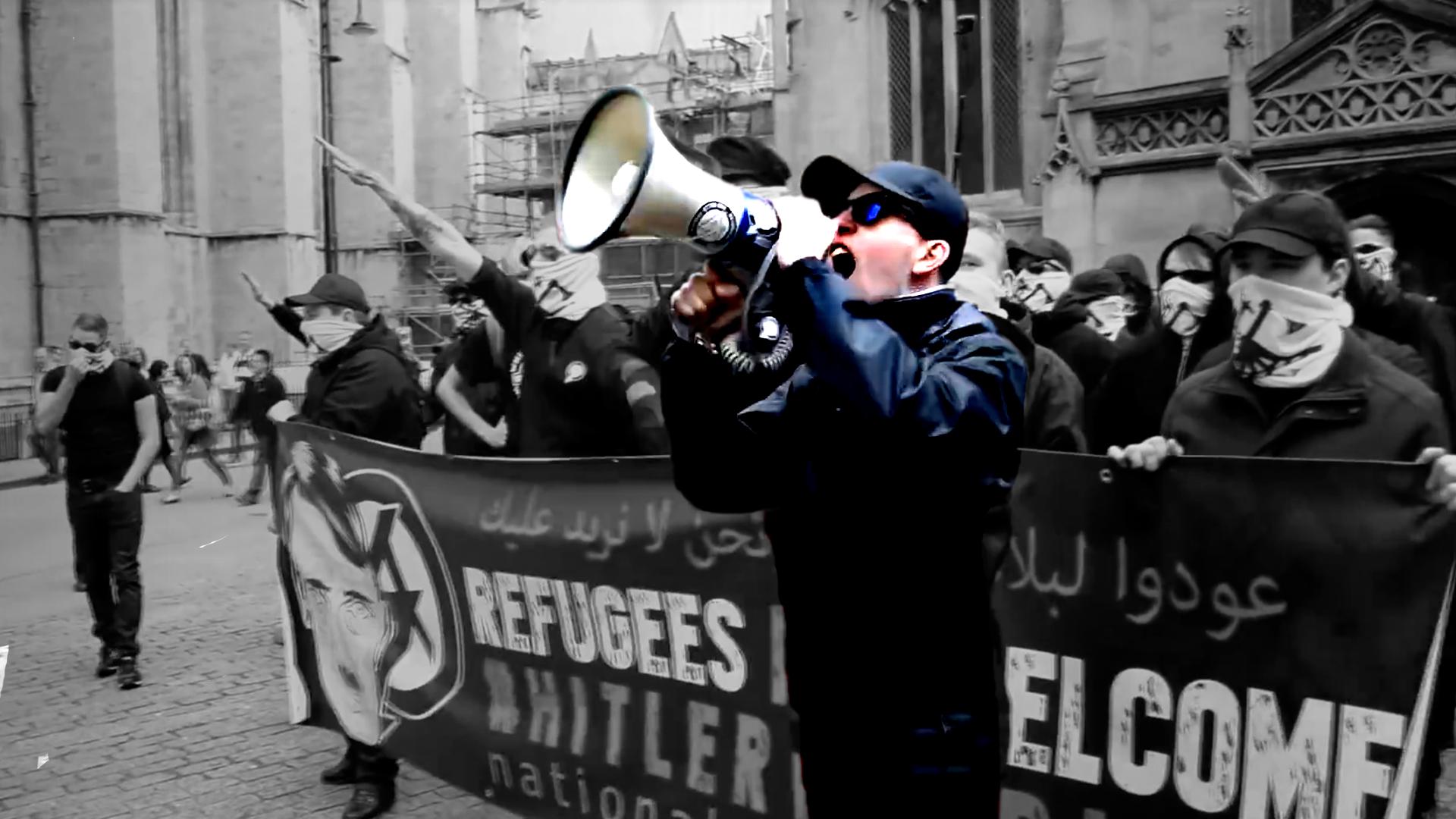
Alex Davies
It had all the characteristics of post-war neo-Nazism - hatred of non-white and Jewish people, a worldview entirely based on racism, veneration of white "Aryans", and lionisation of the Nazi era and its worst war criminals.
Davies was eventually forced out of Warwick university for his far-right political activities and moved back to Wales, where he eventually found work as an insurance salesman.
The pair believed young people across the UK would eagerly embrace the group's toxic blend of Hitler worship, Holocaust denial, and malicious conspiracy theories.
In reality, it would never exceed 100 members and those it did attract were a disparate set of fanatics united by various deviancies and irrational hatreds.
No attempt was made at engaging in democratic politics, with the organisation instead regarding itself as a youth-based street movement. Its logo was strikingly similar to the paramilitary arm of the Nazi party - the Sturmabteilung, or SA
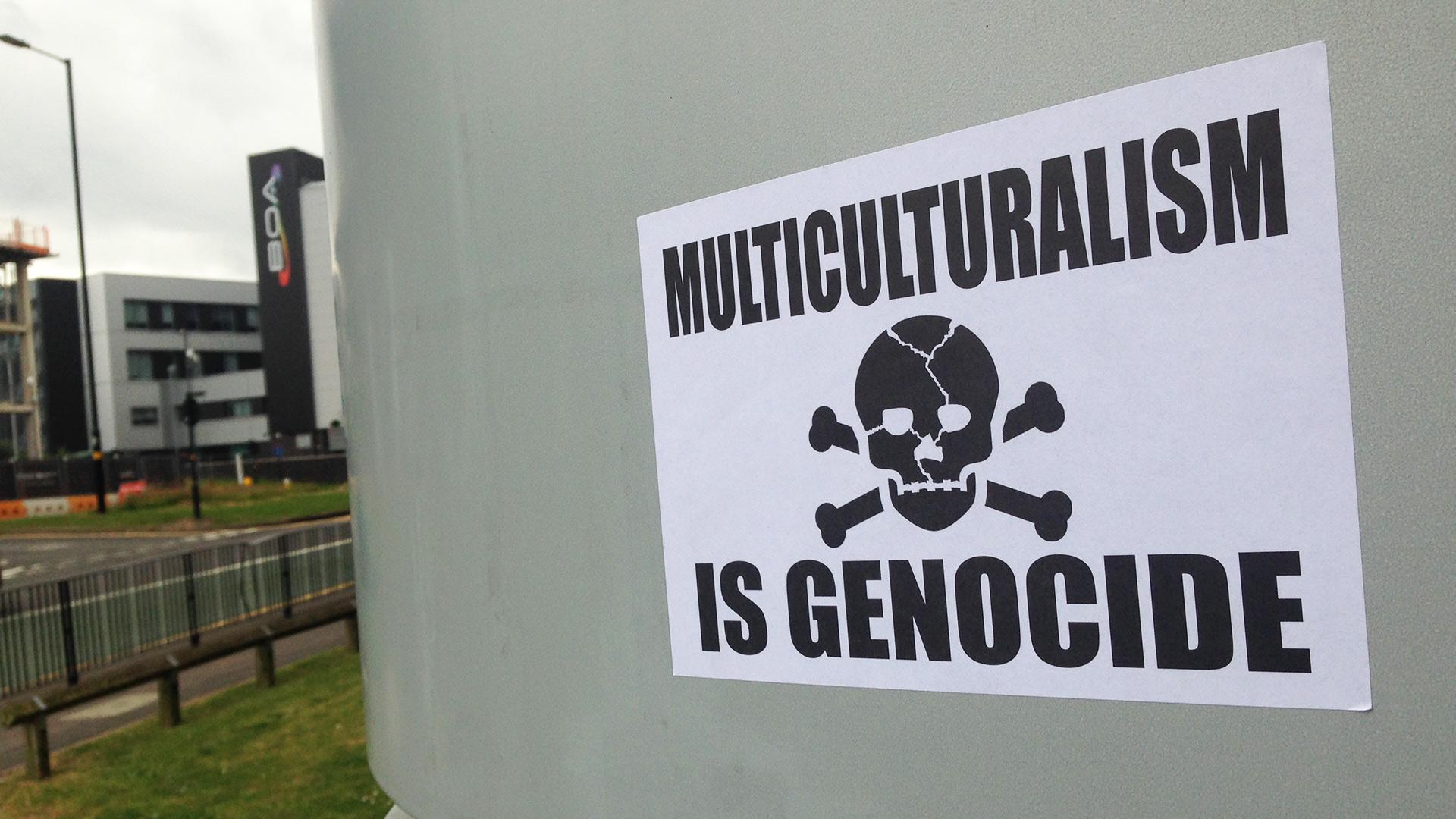
Recruitment focused on those in their teens and 20s, although some of those targeted were children of secondary school age.
The group's strategy initially involved leafleting university campuses. But it soon turned to organising aggressive publicity stunts and city-centre demonstrations, with activities chronicled on the group's website and social media channels.
As it grew, National Action developed into a clandestine network of small, regional networks, with senior figures in each cooperating at a national level.
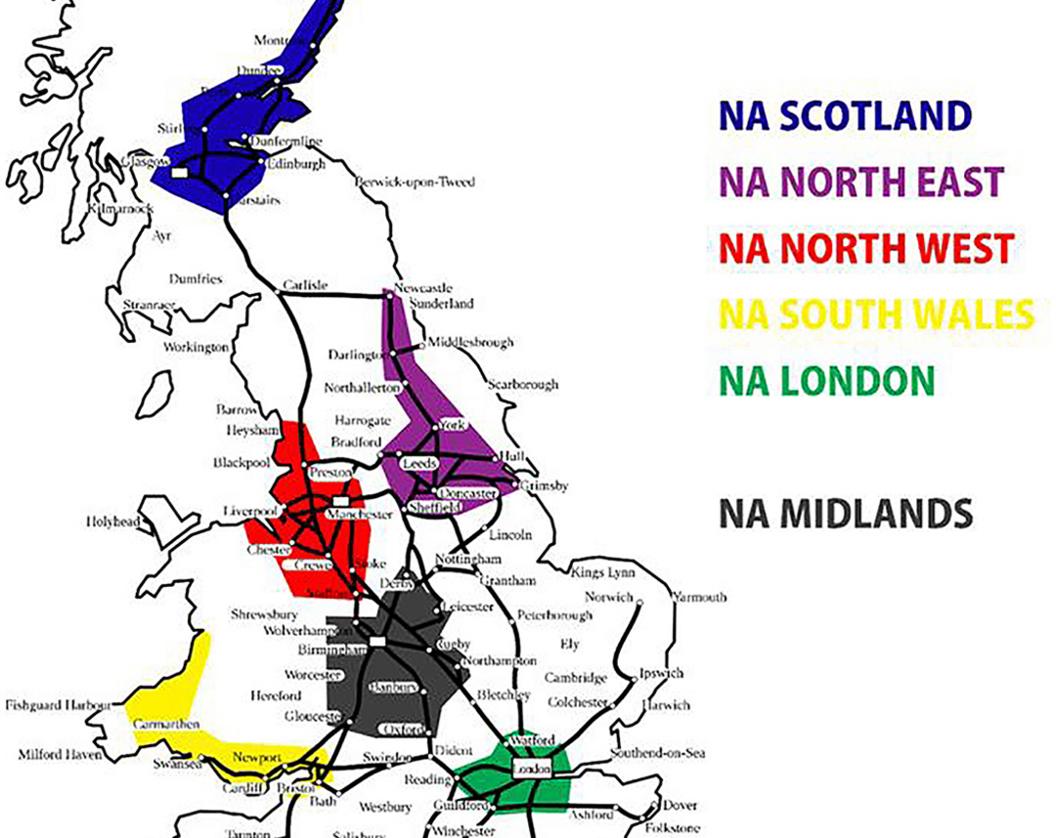
National Action regional map
Members, who dressed in black during demonstrations, promoted the idea that the UK was on the brink of a "race war" and that a predatory elite was deliberately encouraging immigration in an attempt to destroy the native white population.
The group claimed to be patriotic, but was hostile to all domestic institutions, the rule of law, the democratic process, and everyone who did not share its worldview.
Politicians and other public servants were a particular focus of hatred.
During one speech, senior National Action member Matthew Hankinson said they would ensure that "traitors" ended up "hanging from lampposts".
"We must be ruthless - and if innocent people are cut down in the process, then so be it," he said.
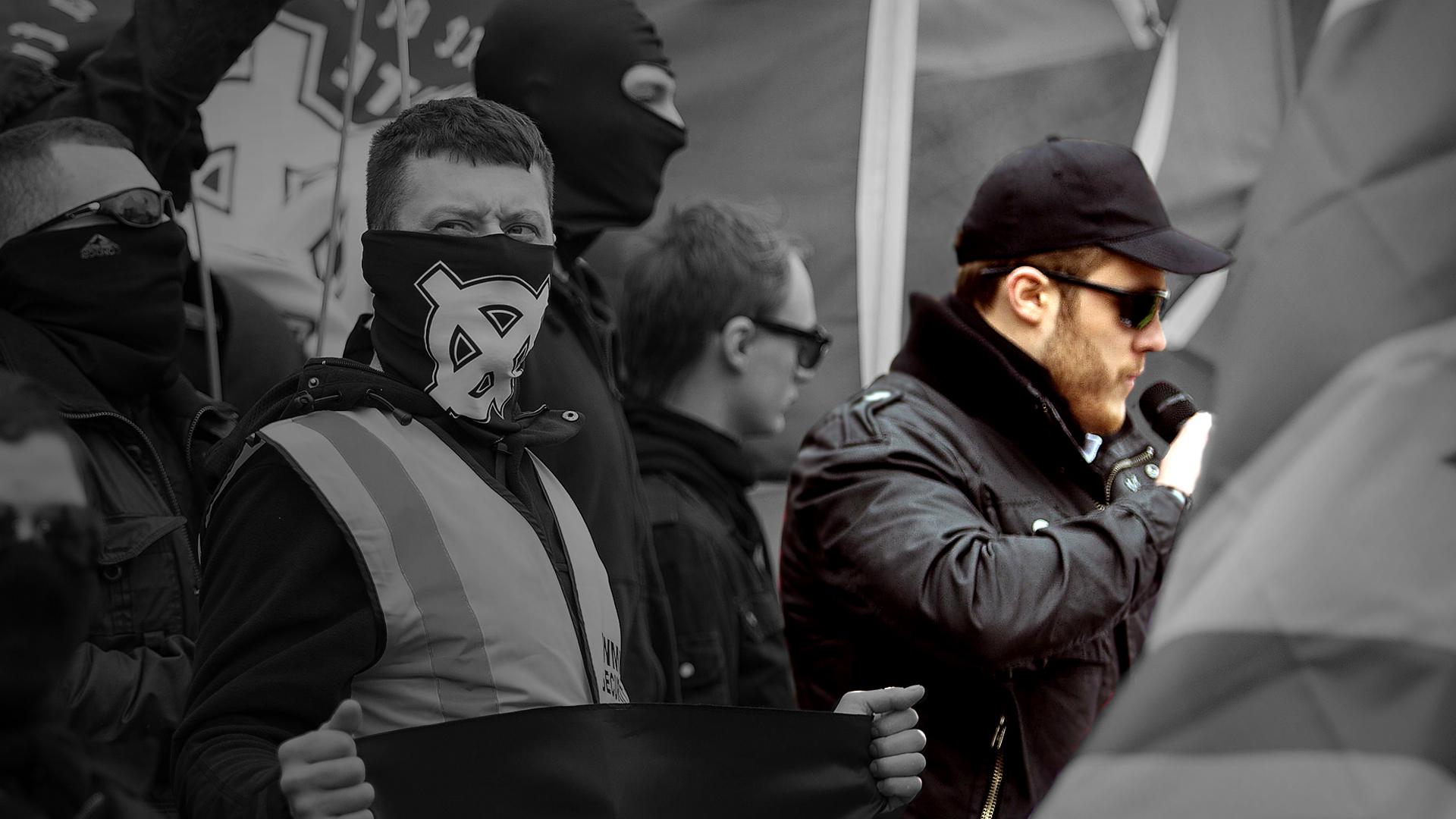
Matthew Hankinson
The organisation was openly genocidal and said that all Jewish and non-white people would have to go. In one document it declared: "It is with glee that we will enact the final solution across Europe."
But National Action did not restrict itself to admiration for the Nazis. Its members also took inspiration from the Khmer Rouge, the brutal regime that ruled Cambodia in the late 1970s under the Marxist leader Pol Pot; the radical right-wing Norwegian terrorist and mass murderer Anders Breivik; and even the Islamic State group.
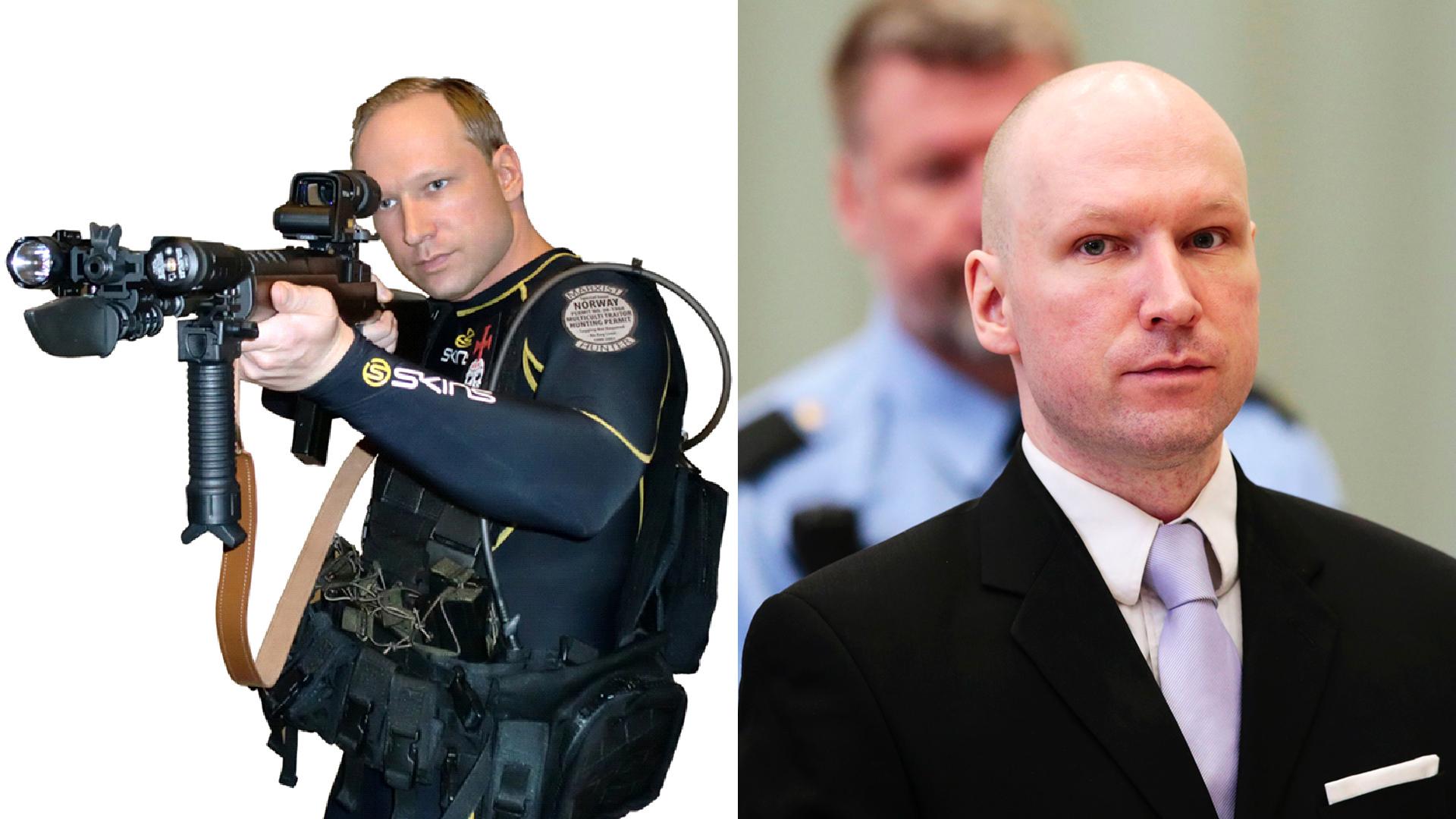
Anders Breivik
Online, the group announced: "We are the white jihad" and "Our motto is 'Long Live Death!' because only those who are willing to die for their beliefs are truly alive."
The logic of such ideas ends in violence - and violence, both planned and executed, is what they generated.
In 2015, Zack Davies, a 25-year-old member from Mold, North Wales, used a hammer and machete to attack a Sikh dentist in a Tesco store because of his skin colour.
Davies shouted, "White power" during the assault, for which he was later convicted of attempted murder.
He had earlier posed for a selfie in front of a National Action flag while holding a blade.
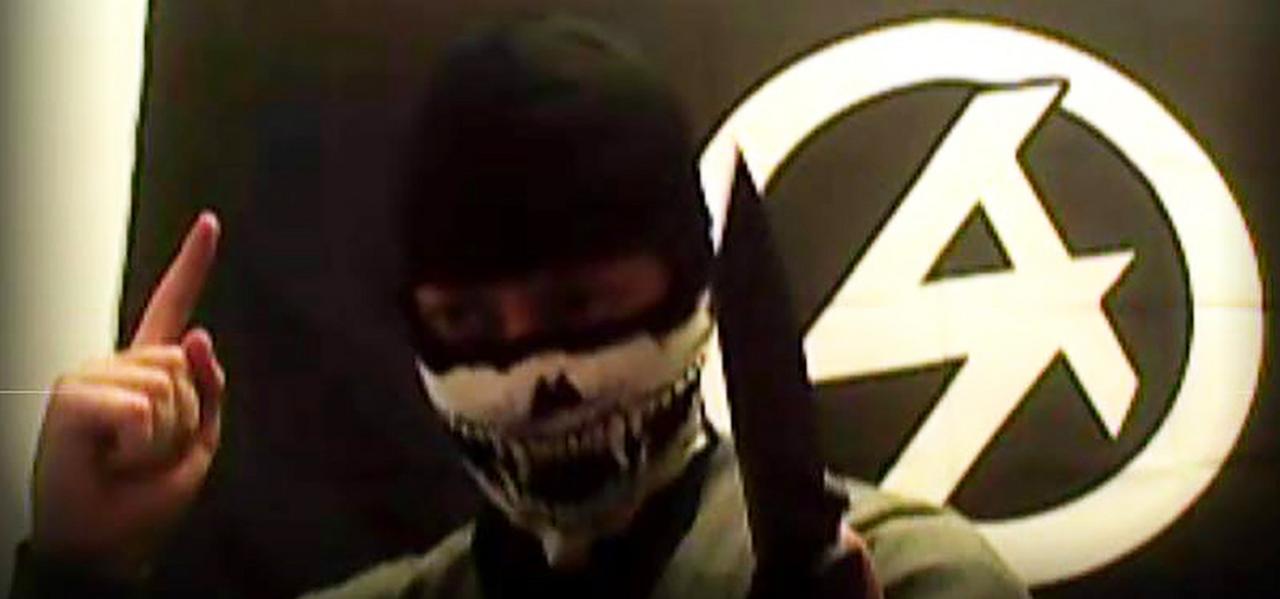
Zack Davies
The following year Jack Coulson, a then 17-year-old member from Bradford, West Yorkshire, was arrested by counter terrorism police after posting images of a homemade pipe-bomb on Snapchat, along with threats against Muslims.
Coulson, who would be convicted of making explosives, had joined National Action months earlier and was associating with older members both in person and online.
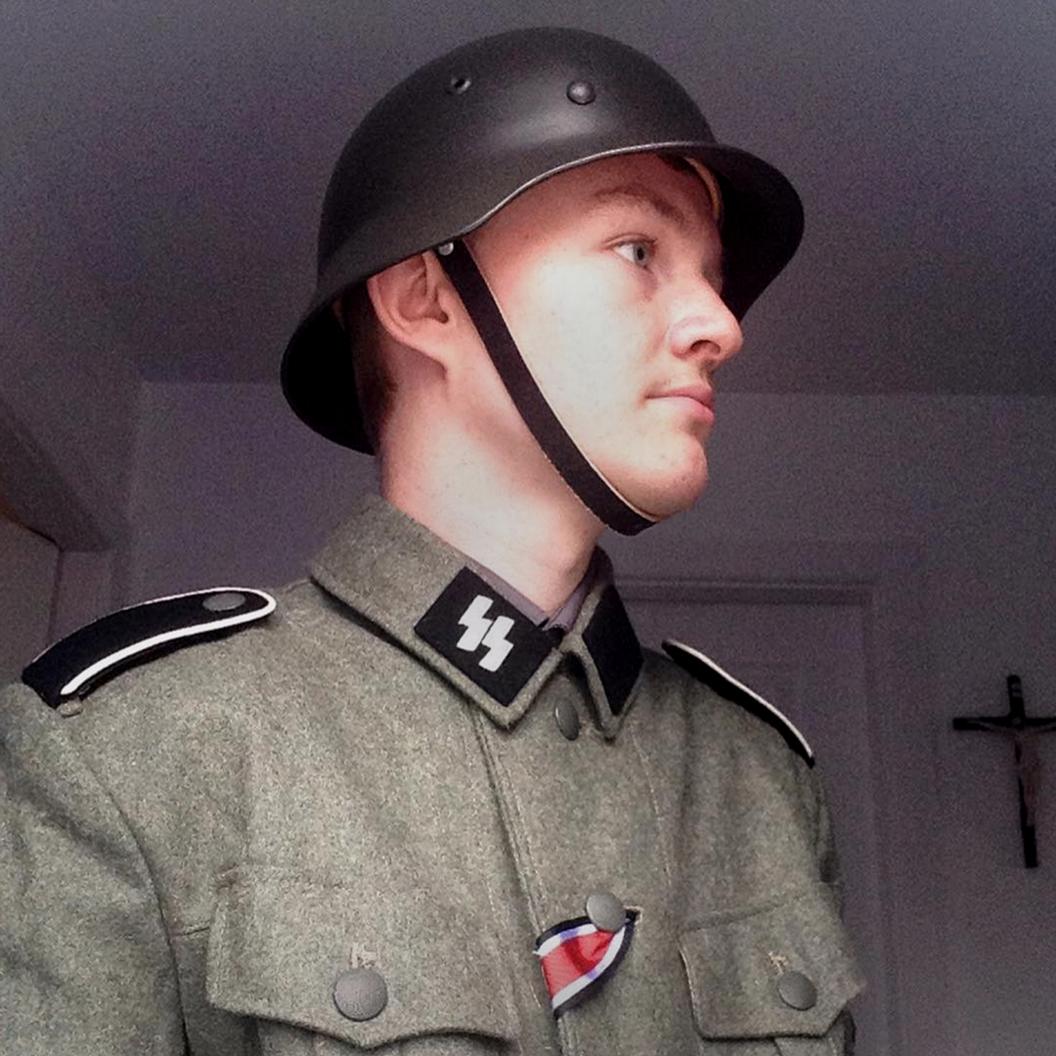
Jack Coulson dressed in a Nazi uniform
On the day in June 2016 that Labour MP Jo Cox was murdered by the white supremacist Thomas Mair, the teenager took to social media to say: "There's one less race traitor in Britain thanks to this man."
"He's a hero, we need more people like him to butcher the race traitors," Coulson continued.
An official National Action Twitter account also celebrated the murder, stating: "Don't let this man's sacrifice go in vain," and "Only 649 MPs to go #WhiteJihad."
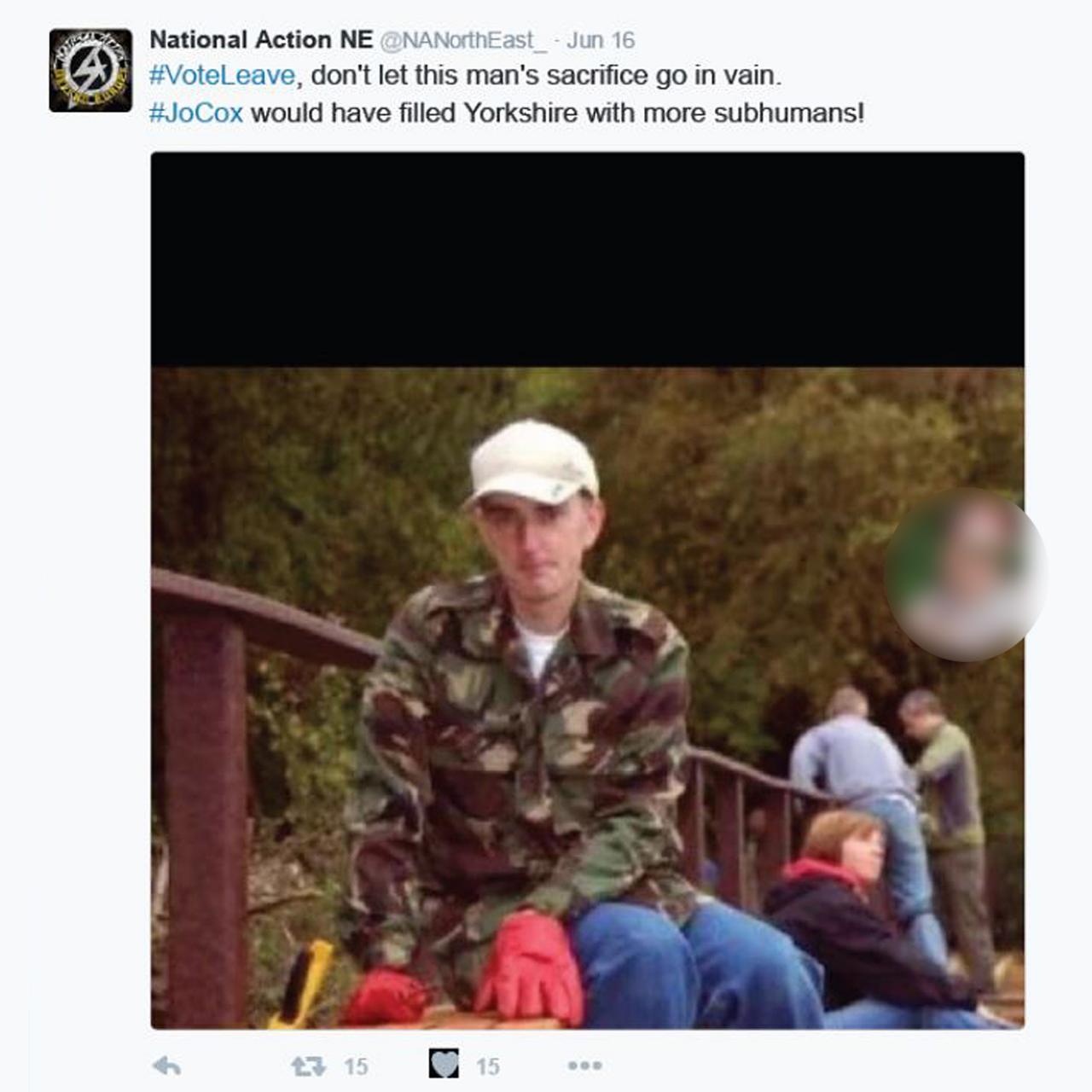
National Action tweet
By 2016, Christopher Lythgoe, a former regional leader for the North West, was heading up the whole group.
Raymond and Davies remained influential figures, but it was Lythgoe, now 32, who sought to enforce structure and rigour on the entire organisation.
He lived with his parents in Warrington, worked infrequently in warehouses, and spent much of his time trying to turn National Action into a paramilitary-style organisation. He drew up detailed manuals, explaining things like how to carry flags correctly, and sent hectoring emails to other members.
In one, he wrote: "Just a reminder guys that National Action now operates what I like to call a No-Deadweight Policy. That means everyone trains in case we need it. We don't carry anyone. No exceptions."
He added: "Imagine what it will be like when we have 20, 30, 50 or more guys who can ALL punch unconscious an 18-stone adversary. AND we will fight as one disciplined body. That's what I would call formidable unit. So like I said, We all train."
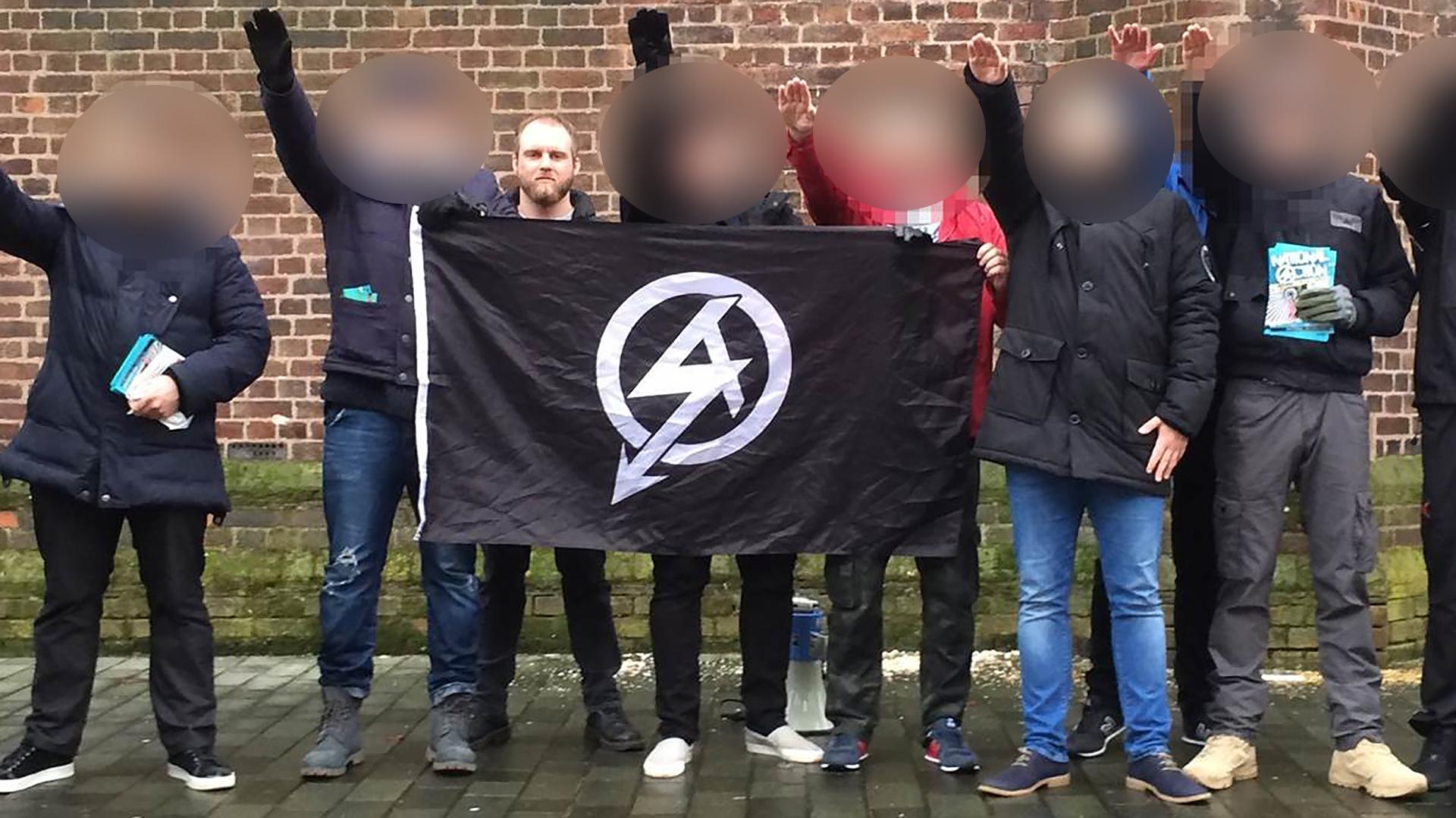
Christopher Lythgoe
Training included boxing, martial arts, and a series of outdoor training camps. One such camp - where participants were expected to "drink mead and live like Vikings" - ended in farce when one neo-Nazi ended up sleeping in a phone box to escape rain and snow.
But one need not consider the group's paramilitary fantasies realistic to find them troubling and dangerous.
The threat National Action posed came from the hatred it encouraged, which generated a very real threat to the general public and anyone chosen as a target by those it radicalised.
A government assessment in late 2016 concluded the group was "concerned in terrorism", and described it as "virulently racist, anti-Semitic and homophobic". It became the first far-right group to be proscribed in this country since World War Two.
The move, which made membership of National Action a criminal offence, was specifically linked to its glorification of terrorism and extreme violence.
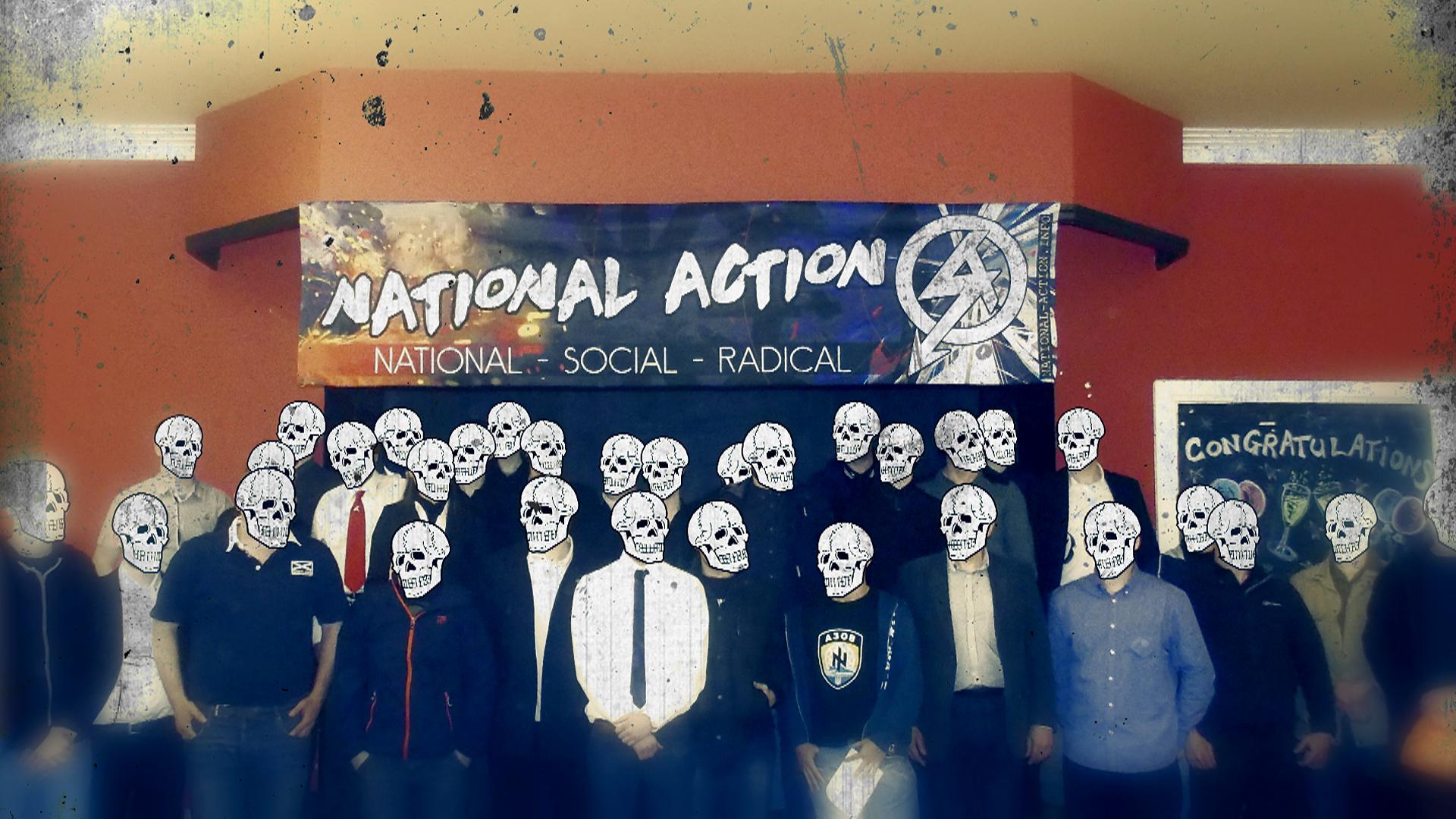
National Action promoting one of its "conferences"
Ahead of the ban, the group's leadership came together via a secure conference call, including Lythgoe, founders Raymond and Davies, and regional organisers.
Lythgoe insisted the group carry on as usual - just without the name or more obvious public trappings.
In the days before the ban, he sent his followers a series of emails.
"Long term we'll keep moving forward just as we have been," stated one.
Another, sent to the regional leaders, said: "Make sure you maintain contact with ALL your members. Reassure them that they will be personally ok as long as they don't promote NA from Friday on. Make sure that they understand that the SUBSTANCE of NA is the people, our talents, the bonds between us, our ideas, and our sustained force of will. All of that will continue into the future. We're just shedding one skin for another. All genuinely revolutionary movements in the past have needed to exist partly underground. These are exciting times."

One of those on Lythgoe's mailing list was Alex Deakin, leader for the Midlands.
Less than two hours after getting the email, Deakin used the encrypted messaging app Telegram to create a chat group that became his main regional organising tool for National Action after the ban.
He called it the Triple KKK Mafia, a reference to the Ku Klux Klan. Over time, the chat group would have as many as 21 people in it.
He created another one - called Inner - which contained a select band of seven from the larger chat group.
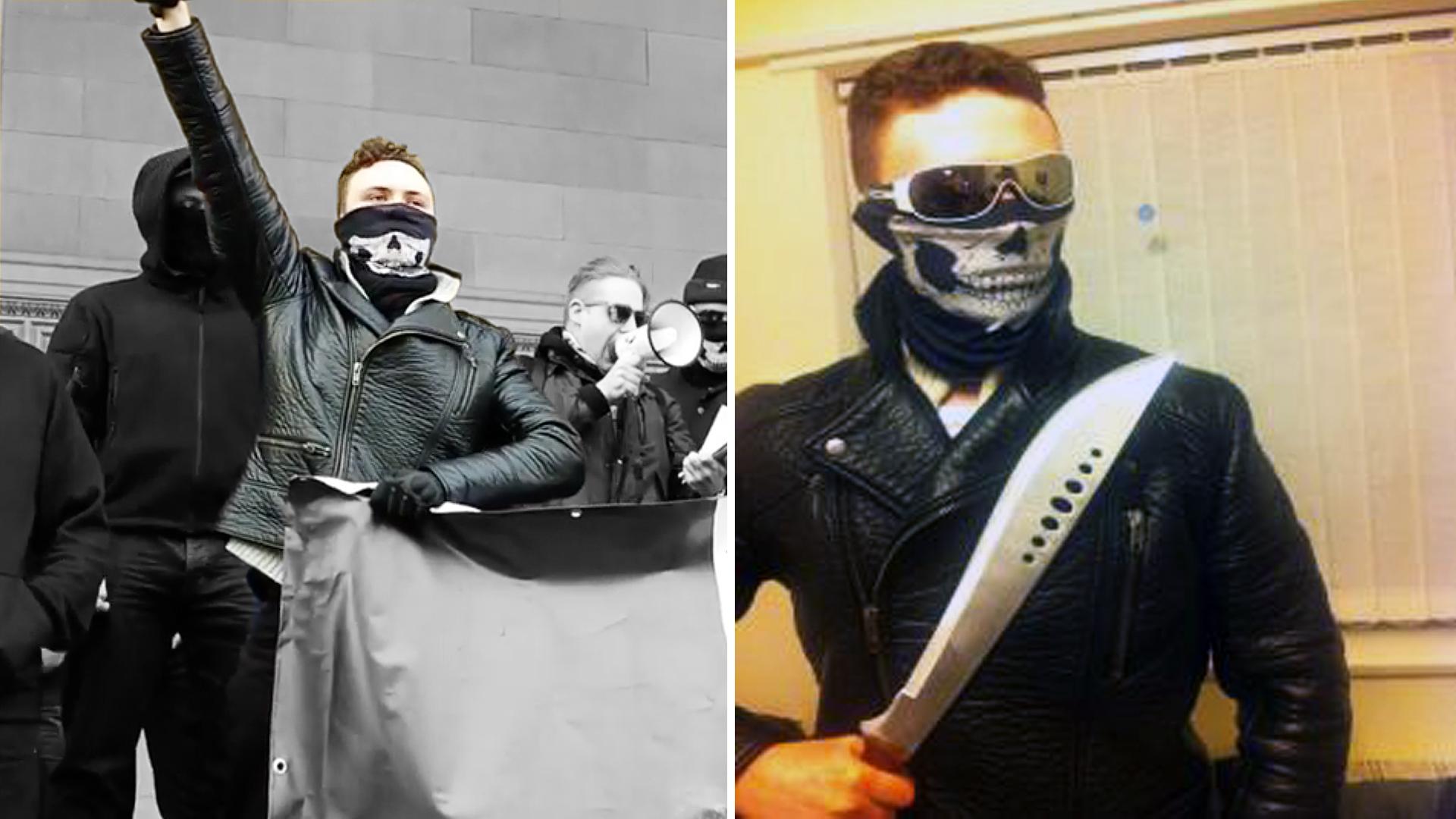
Alex Deakin
Deakin, now 24, from Birmingham, was a university student who had been radicalised on the internet.
In September 2016, after spending two years studying in Aberystwyth, he dropped out and transferred to a history course at the University of Coventry.
He told one contact his path to National Action involved "getting redpilled by forums, spending years arguing online, and then finally deciding to take action when this group impressed me".
Deakin regularly reported back to Lythgoe and co-founder Raymond, telling them about his efforts to recruit new members, organise existing ones, and spread National Action propaganda.
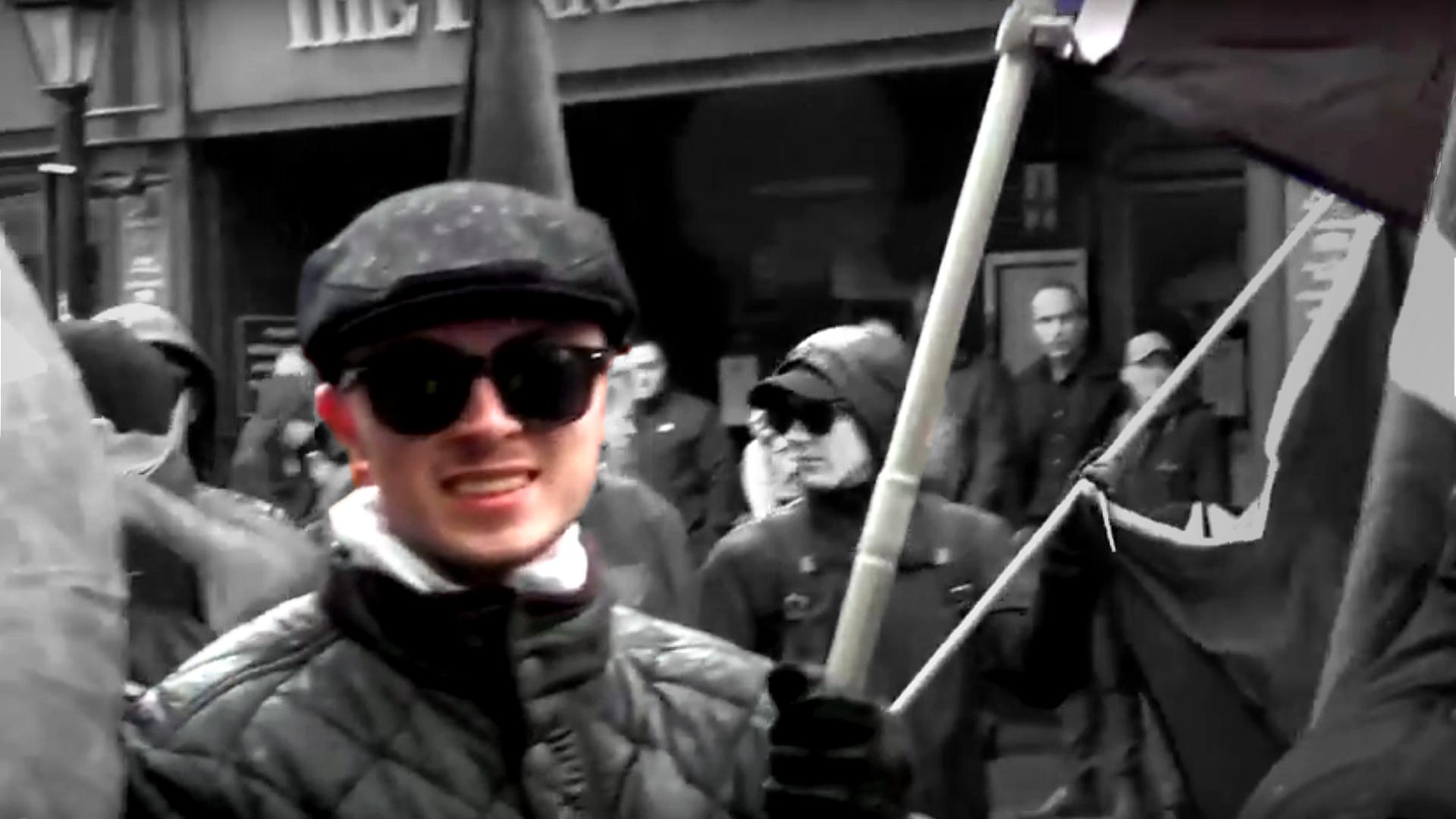
Alex Deakin
Messages in the year before the ban show the extent of his delusional ambitions.
In an exchange about targeting working class cities, he wrote: "We should move to radicalise these areas, turning them into NI [Northern Irish] style sectarian ghettoes would be the first target to fermenting race war."
In correspondence with Lythgoe, Deakin stated: "Like the IRA and Viet Cong we'd need to have embedded local support among the communities we'd fight in; streets and cul-de-sacs would function as barracks as supportive locals would shelter us, and it would be necessary to fade into the background at moment's notice."
The nature of such conversations only intensified once the group had been proscribed.
In the Midlands, the organisation ceased overt campaigning, but members continued to communicate, meet up, seek new recruits, and encourage one another's worst tendencies.
There were explicit references to the the fact that National Action still existed.
In one message, Deakin said: "Anyway the Midlands group continues under the name Triple K Mafia."
In another, Adam Thomas wrote: "So since NA has been destroyed, the leadership generally of NA agreed it's to be disbanded. No attempt at revival. But the Midlands branch of NA, which is just 17-20 of us, have decided to ignore this... Midlands will continue the fight alone."
Messages in the Telegram group, numbering in the thousands, show members using violent racist language, discussing their desire for a "race war", and fantasising about the murder of those they hated.
Deakin wrote that all Jewish people should be "burned", and that Chinese and black people should be turned into "biofuel".
A member from Wolverhampton, Darren Fletcher, 28, referred to Thomas Mair, the killer of Jo Cox, when he asked: "Why aren't there more Mairs out there? We need a good few hundred of them to sort out these anti-white MPs."
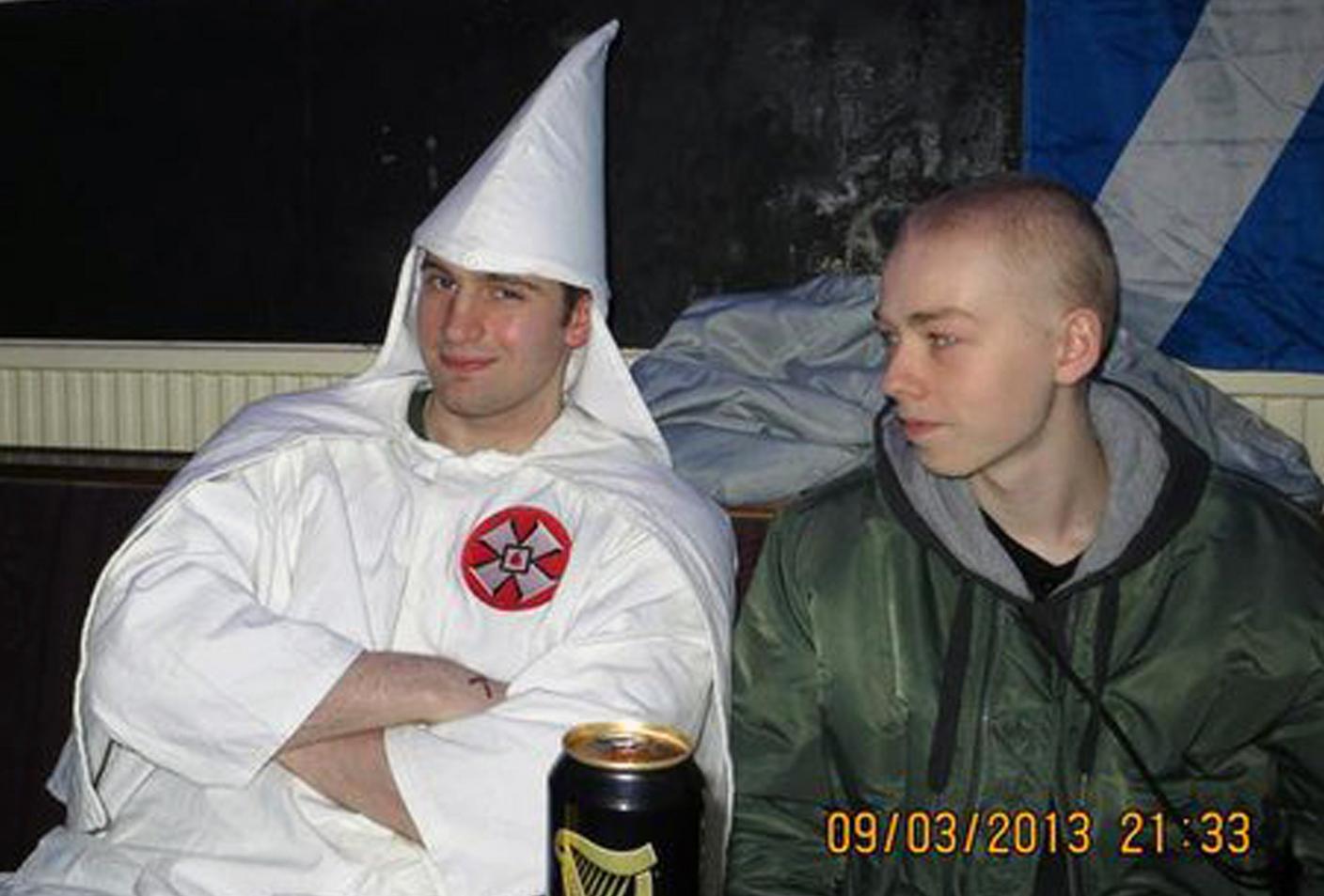
Darren Fletcher and Adam Thomas
Fletcher, a truck driver and old friend of Adam Thomas, had once been jailed after posting videos on YouTube of himself on stage at an extremist music event dressed in a KKK outfit, hanging a life-sized golliwog doll from a noose.
When Fletcher wrote that people in government should be killed, he received support from Thomas, who said: "I agree bump them off but there's 600MPs unless you take them all down in one go they will just replace each other."
Claudia Patatas, who studied to postgraduate level in Portugal before moving to the UK over a decade ago, had spent years as a marketing professional. In public she provided bland quotes to corporate journals, while in private she wrote messages exclaiming: "All Jews must be put to death" and "bring back those concentration camps."
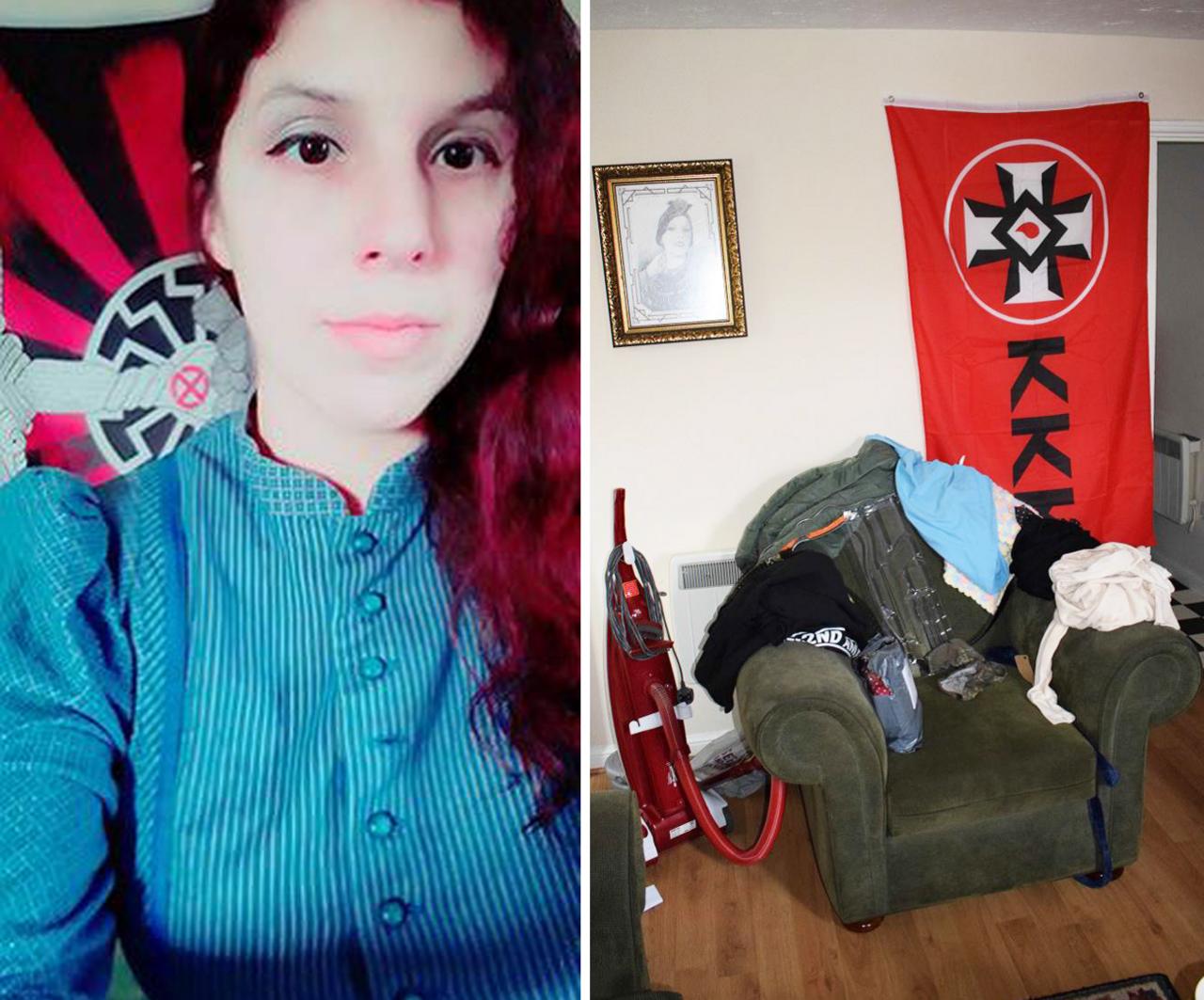
Claudia Patatas and a KKK flag in her home
She told members of the group that "Adolf is life" and was enthusiastic about holding a celebration for Hitler's birthday, recalling one she had attended in Lisbon years earlier.
"We had a cake with the fuhrer face," she described, before adding, "I did struggle to slice his face".
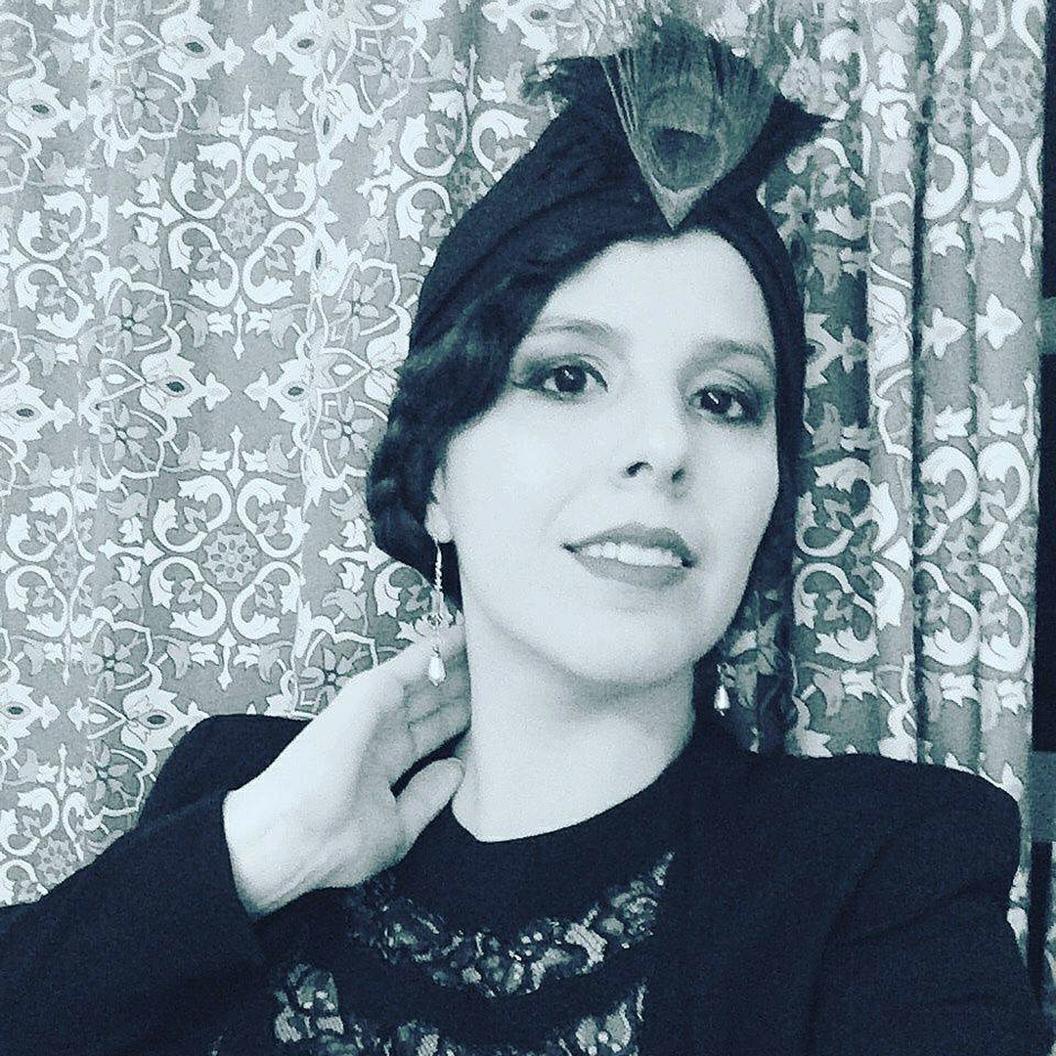
Claudia Patatas
Perhaps the most dangerous member of the group was a serving lance corporal in the British Army.
Mikko Vehvilainen, now 34, joined the Army in 2012, having earlier spent time in the navy in Finland, the homeland of his father.
In an email to one friend, he wrote: "I'm only in to learn useful combat skills."
The married father of young children, an adherent of a white supremacist interpretation of Christianity called Christian Identity, was a senior National Action member obsessed with ideas about the collapse of civilisation and racial war.
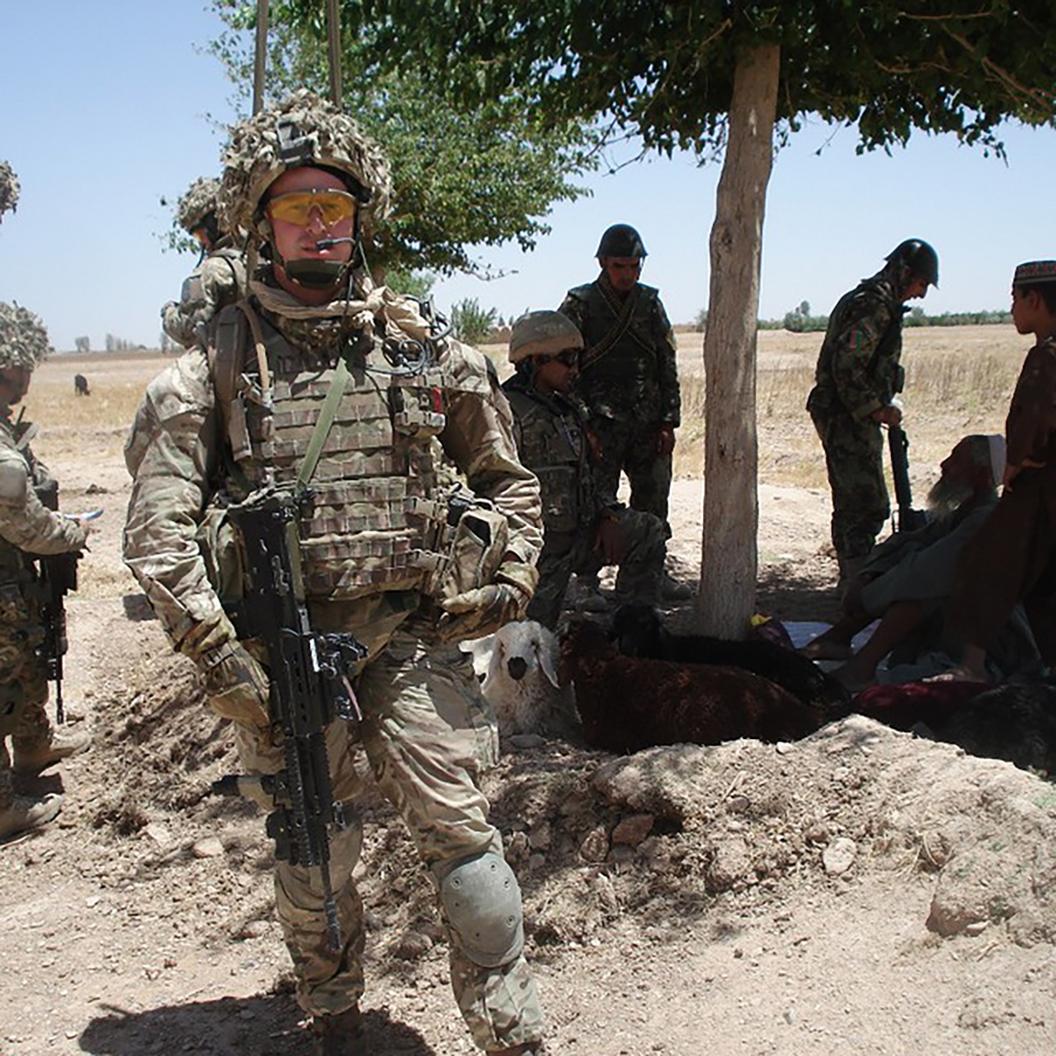
Mikko Vehvilainen
In a diary entry last year, beneath the heading "key points for leadership meeting", he referred to "later stages terrorism, civil disorder, destruction of infrastructure and power grid".
In another document, he said there a was a need to be "prepared to fight and die for your race in a possible last stand for our survival".
"Every part of me wants war. There is no other way," he wrote in one message on Telegram.
His personal weapons collection, stockpiled for what he appeared to regard as imminent conflicts, included legally held firearms, as well as knives, machetes, knuckle dusters, a crossbow, a bow and arrow, pepper spray, handcuffs, and a so-called war hammer bearing the Biblical inscription: "There is no peace, says the Lord, for the wicked."
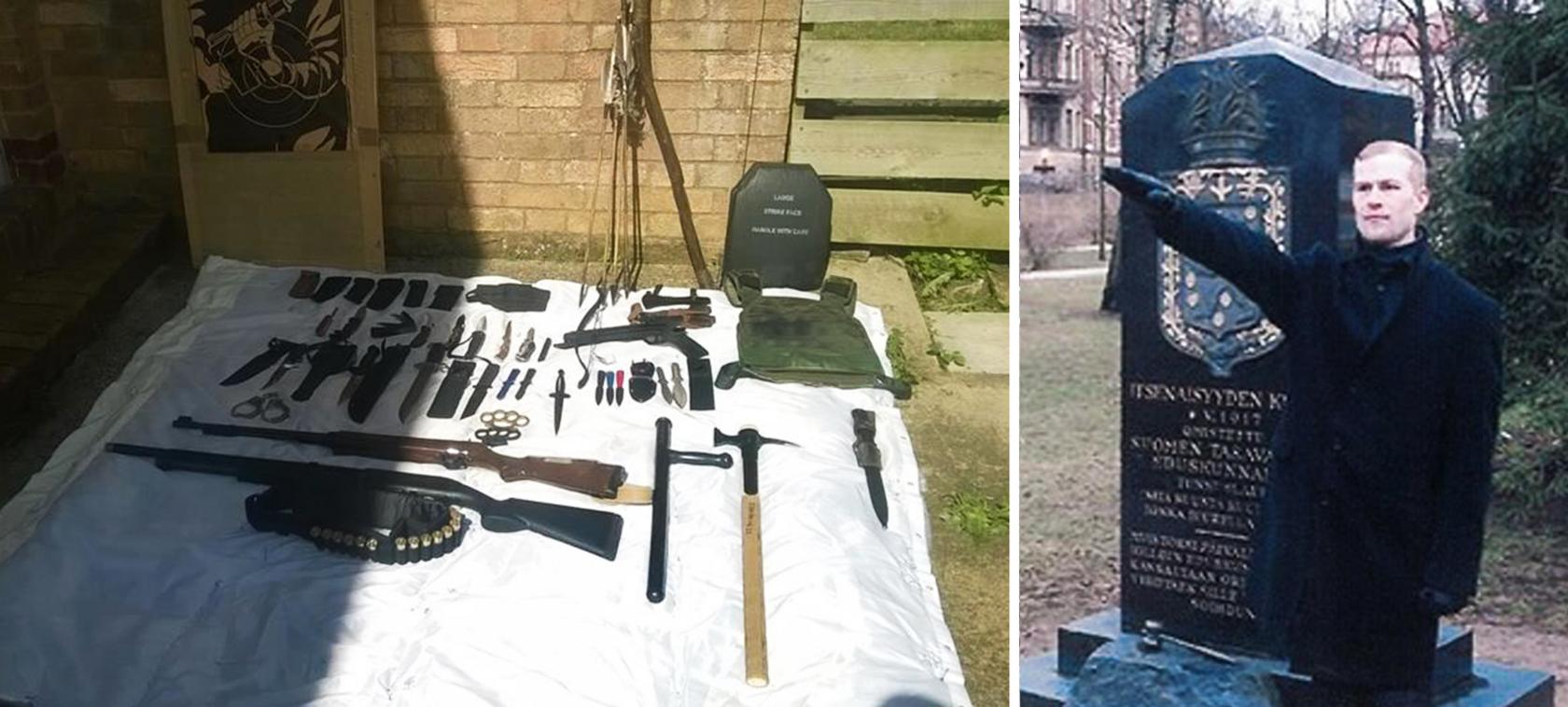
Vehvilainen's weapon collection - and photo of him performing a Nazi salute
The solider, latterly based at the Army's Welsh headquarters in Powys, actively sought recruits from those serving under him in the Royal Anglian Regiment.
Three men holding the rank of private were invited into the main Telegram group after Vehvilainen told Deakin they were "committed" Nazis.
One of them, Mark Barrett, wrote racist messages in the chat group, and had Vehvilainen, another of the soldiers, and a National Action member called Nathan Pryke, over to his Army property where they spent an evening firing arrows at a burning cross in the back garden.
Vehvilainen, who served in Afghanistan, was also keen that civilian neo-Nazis join him in the forces, telling them: "If we get enough of us into the Army, we'll be in the right place when things start to collapse."
He wrote in the Inner chat group that National Action members should focus on gaining "military and key civil positions".
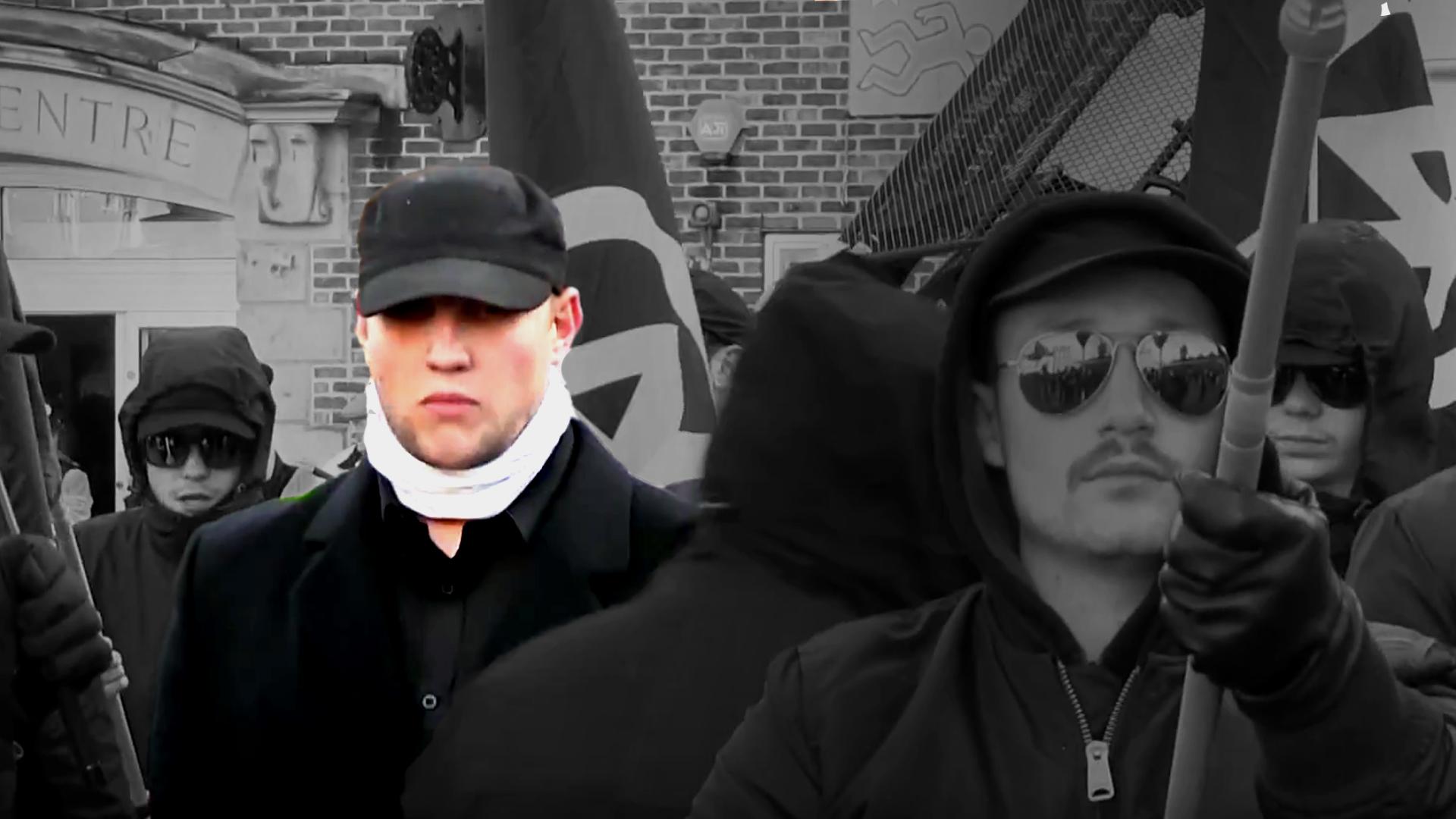
Nathan Pryke
Four National Action members in his circle had been, or were, attempting to join the Army: Alex Deakin, Adam Thomas, Nathan Pryke, a 27-year-old a van driver from Cambridgeshire, and Joel Wilmore, 24, originally from Lincolnshire, who had served in the Territorial Army before entering a sensitive job as an information security expert. This involved acting as an "ethical hacker" in order to test the strength of organisational IT systems.
Vehvilainen advised Thomas and offered to act as a referee of good character.
Thomas, in turn, asked if he could buy a gun from Vehvilainen and whether anybody would notice if assault rifles were stolen from his base.
But, before anything more could happen, the group was disrupted.

For several months, detectives from West Midlands Police had been investigating an incident in July 2016 during which several men had pasted National Action stickers at the Aston University campus in Birmingham.
In spring 2017, some of the suspects were arrested, including Alex Deakin.
Incriminating chat groups were found on his phone, and that of another man who cannot be named for legal reasons.
After being released under investigation, Deakin sent a panicked email to several National Action contacts. "My seized phone is full of texts that will mark me as an organizer," he wrote. "I understand if you despise me for this sloppiness (it really couldn't have been worse if I tried)."
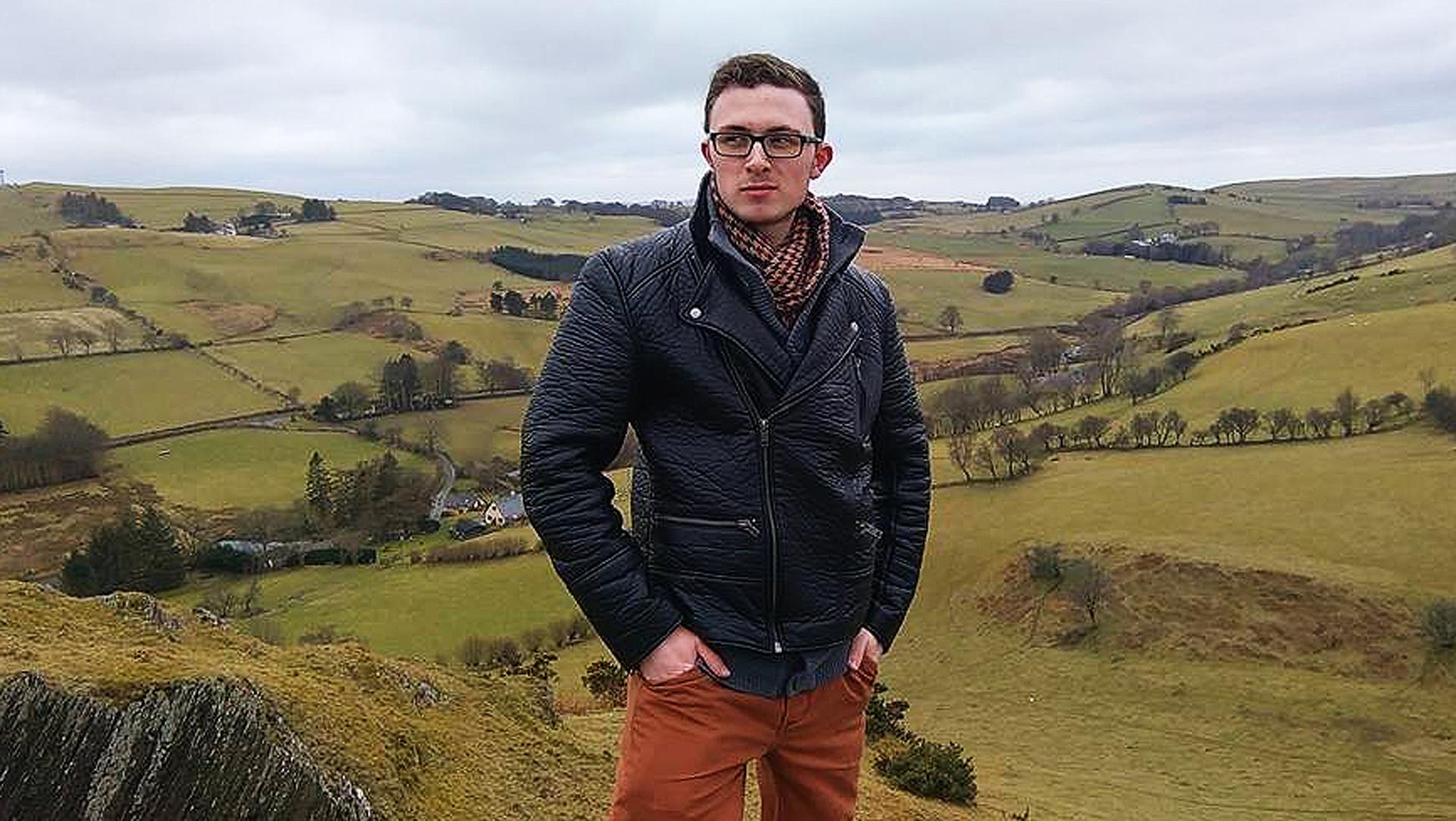
Alex Deakin
Deakin's "sloppiness" led to three trials at Birmingham Crown Court this year, many details of which can only be reported now that the final one has concluded.
The first, which ended in April, saw Deakin himself, Vehvilainen and soldier Mark Barrett stand trial accused of National Action membership.
Barrett was acquitted, but his co-defendants were convicted and received eight-year prison sentences.
The three had been arrested in September 2017, along with the other two soldiers in the chat group, both of whom were released without charge.
Only Barrett elected to give evidence, telling the court that he had not joined National Action despite being in the Telegram chat group and that he regretted his racist postings.
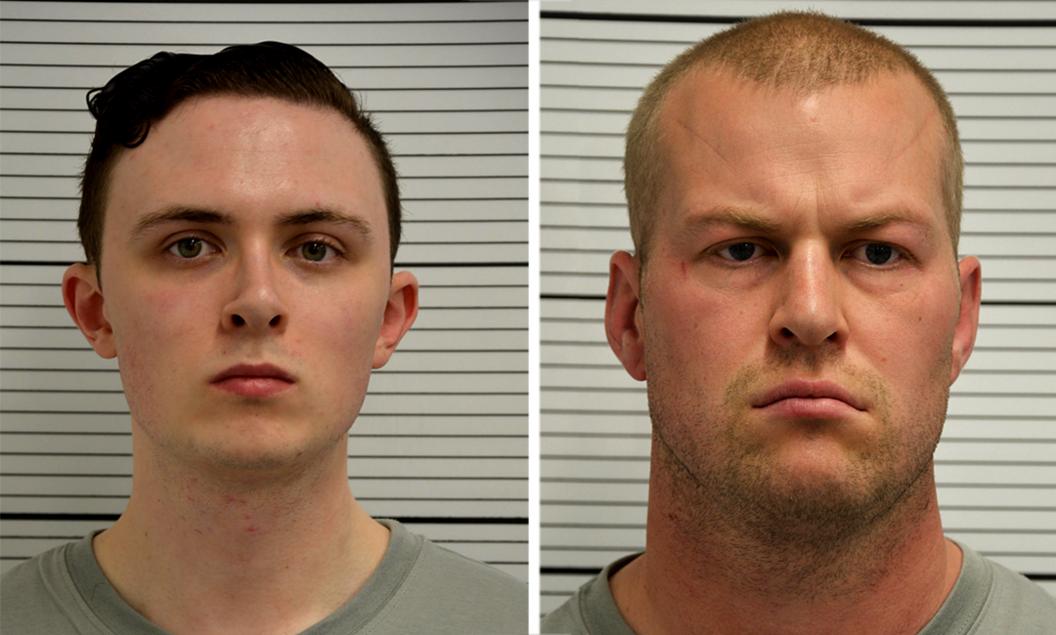
Alex Deakin and Mikko Vehvilainen
Deakin was also convicted of two counts of possessing documents useful to someone preparing an act of terrorism - including bomb-making manuals and an instructional book for white extremists - which were found on his laptop.
He was further convicted of distributing a terrorist publication, for sending a document called Ethnic Cleansing Operations to the National Action co-founder Ben Raymond and two other contacts.
Vehvilainen was cleared of stirring up racial hatred for using a Christian Identity online forum to write racist posts. Among other things, he wrote: "I have vowed to fight the Jew forever in any way possible," and used the word "beasts" to refer to black people.
Referring to his position in the Army, he had written: "There are ways around everything and I've simply learned to avoid beasts."
He added: "The sooner they're eliminated the better."
It is understood that both Vehvilainen and Barrett have since been discharged from the Army. The other two arrested soldiers were disciplined but not discharged, although one has since left voluntarily.
Lt Col Jackie Fletcher, from the Army personnel branch, described them as "exceptional cases".
"These are very rare in the Army," she said. "The Army's value and standards are very clear for soldiers and any individual found to breach those value and standards will have action taken against them."
The second trial, which ended in May, saw Deakin and three other men convicted of stirring up racial hatred in relation to the sticker campaign at Aston University - Daniel Bogunovic, 27, a warehouse worker and beekeeper from Leicester, Chad Wiliams-Allen, 27, a pre-ban National Action member and welder from West Bromwich, as well as a man in his early 20s who cannot be identified for legal reasons.
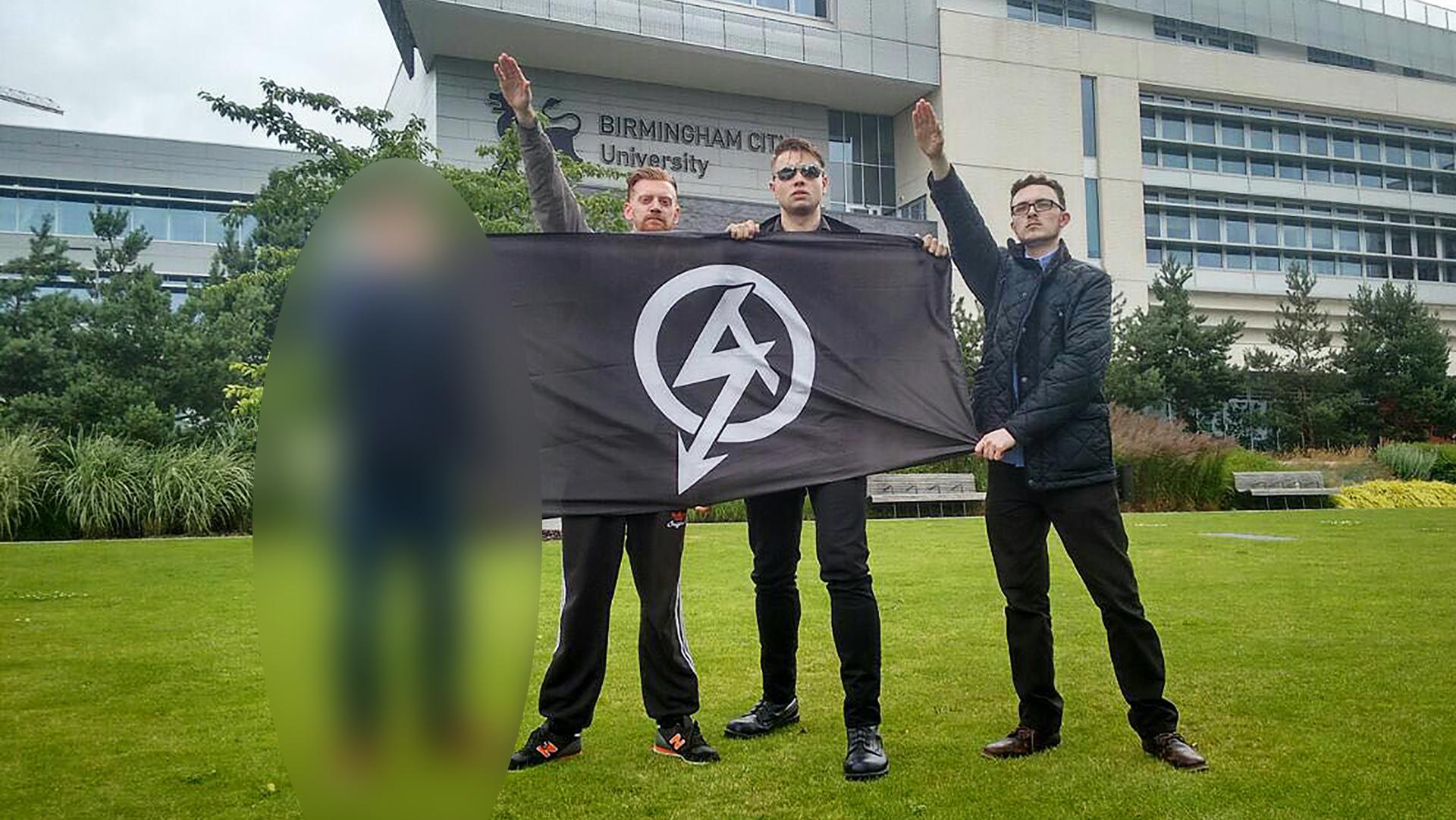
Chad Williams-Allen, Daniel Bogunovic and Alex Deakin
In the third case, that of Thomas, Patatas and Bogunovic, three other defendants pleaded guilty to membership of National Action in pre-trial hearings.
They were Darren Fletcher, Nathan Pryke, and Joel Wilmore. Wilmore also admitted to possessing terrorist information, namely a document called Homemade Molotov Cocktails.
Thomas, who was also convicted of possessing a bomb-making manual, was the only one to give evidence.
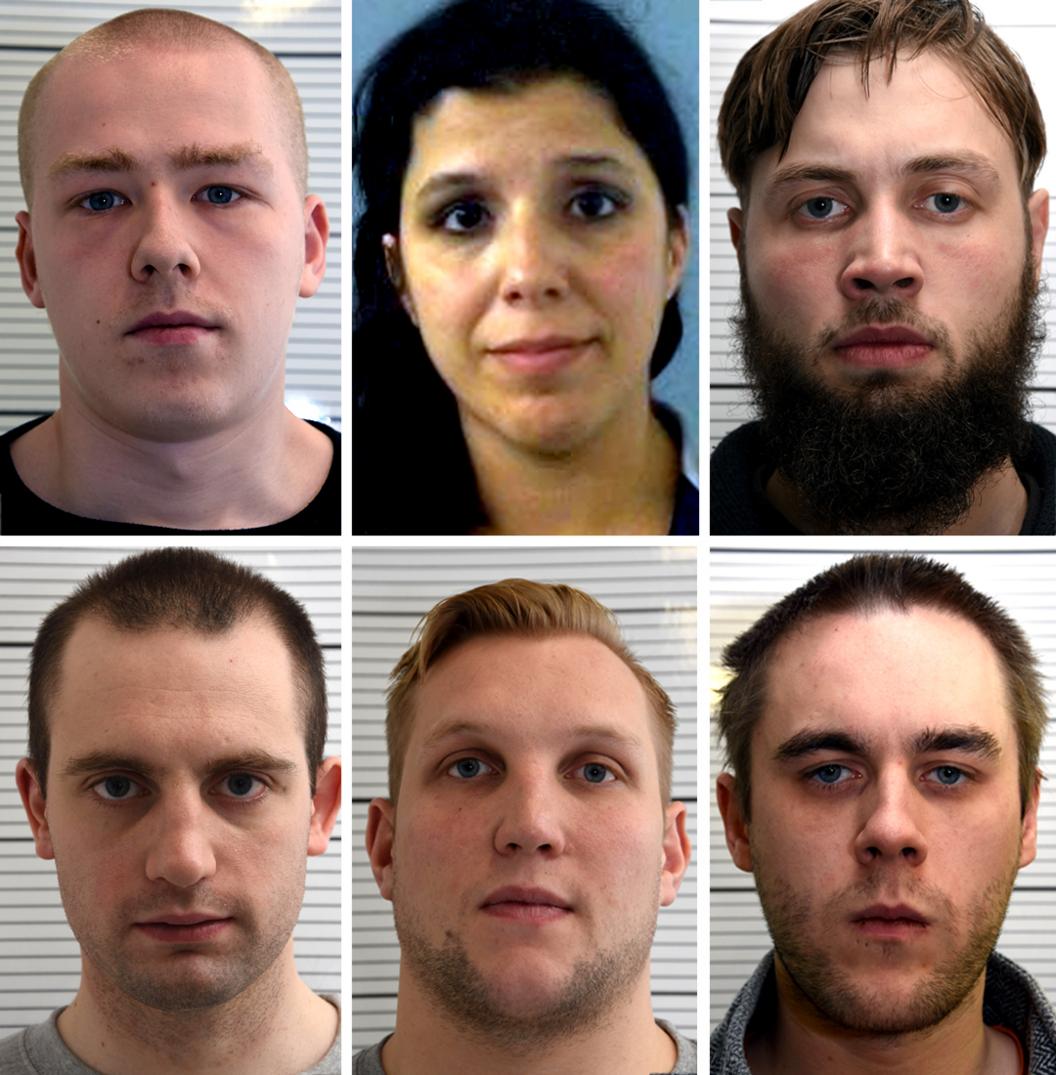
Adam Thomas, Claudia Patatas, Daniel Bogunovic, Darren Fletcher, Nathan Pryke and Joel Wilmore
The former Amazon security guard admitted being a racist and told jurors he had been exposed to such beliefs from a young age, adding that his stepfather was in a "white power band" and had started shaving Thomas's head at the age of five.
He also described telling a female Holocaust survivor, whom he visited with a government de-radicalisation mentor, that he "couldn't see" how she could have endured the WW2 Nazi death camps.
Thomas told jurors that, aged 18, he went to Israel and considered converting to Judaism because it would have allowed him to join the Israeli military
The BBC has spoken to people who knew Thomas in Israel.
David Simpkins, who shared a room with him at the Machon Meir yeshiva in Jerusalem, said his roommate used the name Avi Ben Abraham.
Simpkins said Thomas had described a "horrible childhood which he characterised as a situation of constantly being bullied, growing up with far-right British extremists who were also neo-Nazis".
Thomas disclosed that he first "started learning about Judaism to discover why he was supposed to hate them," Simpkins recalled.
He described Thomas as "extremely intelligent" but said he had "an extreme approach to Judaism" and wanted to join a small fringe group which regards most Jewish people as heretics.
"The rabbis decided that Adam needed to deal with his childhood professionally and return to convert with a clear head," he said. "He was making the common mistake many who desire conversion make, which is to replace one psychological extreme with another."
Avishai Grosser, who works with converts, told the BBC that Thomas, who "knew big proportions of the Torah by heart", dropped out of several conversion programmes and eventually ended up on the streets before returning to the UK.
It is understood that, after he returned, he told people in far-right circles that his time in Israel related to an involvement with the white supremacist Christian Identity movement.
It was around this time that he got to know Patatas through National Action chat groups. They met for the first time at a pub social in December 2016 and soon moved in together.
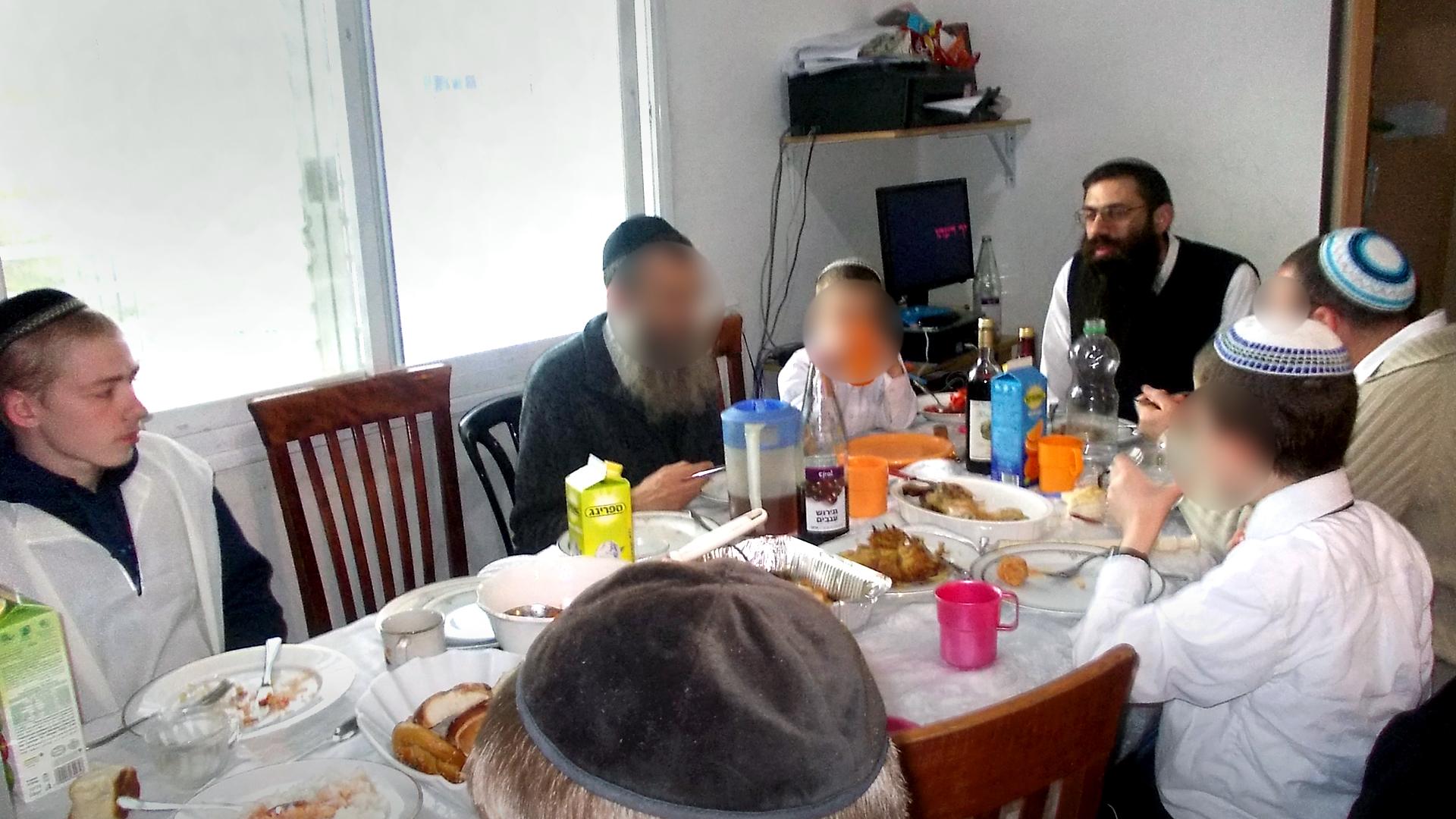
Adam Thomas in Israel
Before proscription, National Action may have been "perceived as just one of those groups who incited racial hatred and were racist", says Det Chief Supt Matt Ward from the West Midlands Counter Terrorism Unit.
He explains how his team's understanding of the threat posed by National Action has "changed considerably" during their investigations.
Events after it was banned, he says, show "a really dangerous, well-structured organisation at the heart of a neo-Nazi ideology that seeks to divide communities, is preparing to instigate and wage a race war within the United Kingdom and has spent years acquiring skills, tactics, weapons, recruiting and training people to be able to do that."
As in the Midlands, National Action had continued operating covertly in the North West, but had continued more overtly in several other English regions and Scotland using the aliases NS131 and Scottish Dawn.
There are ongoing inquiries into people associated with the group, and several trials have already taken place elsewhere in the UK.
At the Old Bailey in July, Christopher Lythgoe and Matthew Hankinson, both from the North West, were convicted of membership offences in a trial that saw another man plead guilty to threatening to kill a female police officer, and preparing an act of terrorism by buying a machete in order to kill Labour MP Rosie Cooper.
Mr Justice Jay, sentencing Lythgoe and Hankinson to eight and six years in prison respectively, said their "truly evil and dystopian vision" could never "have been achieved through the activities of National Action, a very small group operating at the very periphery of far-right wing extremism".
But he said, "The real risk to society inheres instead in the carrying out of isolated acts of terror," inspired by what he described as the group's "perverted ideology".

What of the National Action founders who inspired such hatred?
We found Ben Raymond and Alex Davies living at separate addresses in Swansea.
Both were arrested in September 2017 on suspicion of membership of National Action but have been told they will not be charged. Raymond was also arrested on suspicion of possessing terrorist material and remains under investigation for that.
The police enquiries relate to their involvement with the far-right group NS131, which had been created after National Action had been banned. Last year, it was also proscribed.
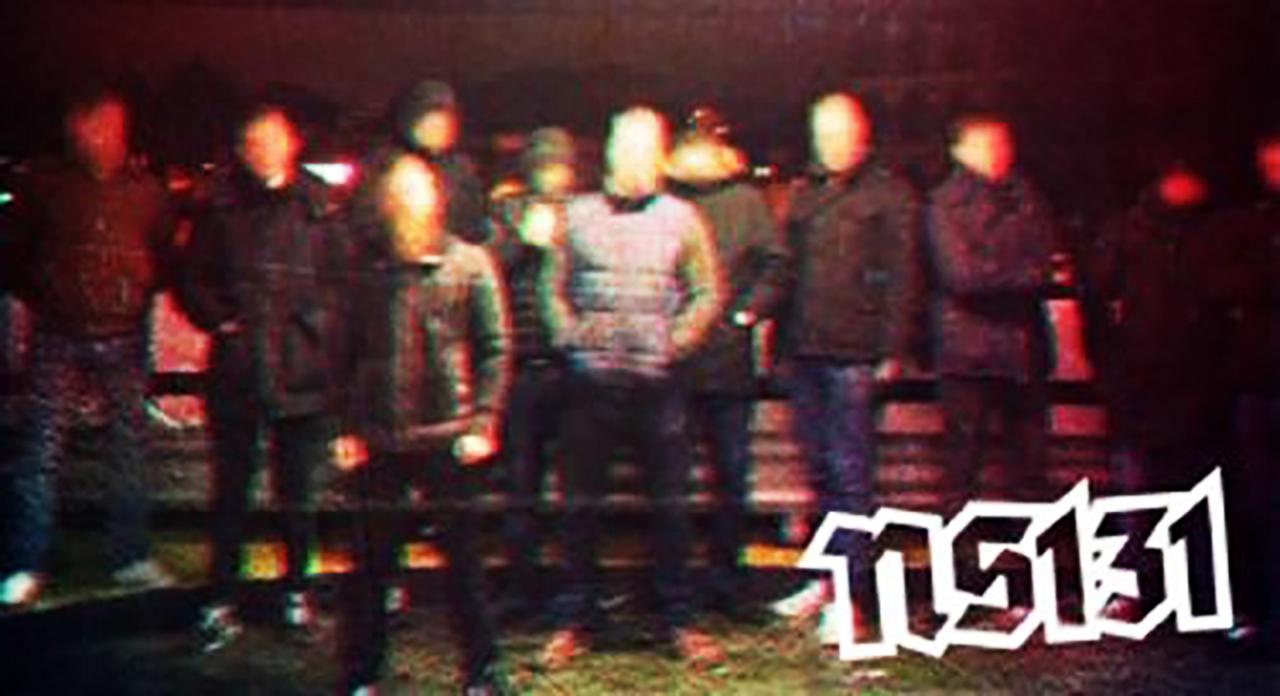
NS131 promotional image
The men have continued to make public pronouncements.
Earlier this year, Davies used an online neo-Nazi radio station to call for far-right activists to engage in a campaign of "direct action" against the Labour MP who succeeded Jo Cox as the MP for Batley and Spen.
Raymond used the same radio station to discuss the trial of Lythgoe and Hankinson while it was ongoing and declare the defendants "innocent men".
The BBC asked both Raymond and Davies for an interview, but they declined.
We wanted to ask whether they accept any responsibility for all that has happened and about their relationship with National Action members since proscription.
For example, a private gym in Warrington set up by group leader Lythgoe for violent training sessions was made possible by £1,500 given to him by Davies - who then visited it along with members of the group after the ban.
Raymond continued communicating with members of National Action, post-proscription, via encrypted emails and applications.
He was an active member of both the Midlands Telegram groups - musing on racial theory, engaging in anti-Semitism, discussing his correspondence with neo-Nazis abroad, and lecturing the others on the threat from infiltrators.
On the day National Action was banned, Raymond had emailed several contacts, including Deakin and Lythgoe, to say he was "super excited about working on all the new projects". Later chat messages show Deakin saying Raymond was responsible for designing propaganda material after proscription.
A hidden webpage containing Raymond's designs over several years, which includes propaganda drawings depicting sexual violence, suggests he created logos for several proposed groups in the period after the National Action ban.
Deakin also kept on reporting back to Raymond - in the same way he had done before proscription - sending him messages about, for example, building dossiers on "problematic" individuals and a sinister idea about creating fake "rabidly anti-white propaganda" and "rabidly pro-Jewish propaganda to push people over the edge".
When the BBC returned to Swansea with a television camera and approached Raymond in the street outside his bedsit, he swore at us and fled inside, refusing to answer questions.
What will happen to the National Action network in the longer term is unclear.
Already proscribed under two aliases - NS131 and Scottish Dawn - it may yet be banned under others, too.
The Islamist group al-Muhajiroun, based around the notorious British radical preacher Anjem Choudary, has been proscribed under nine other names, but the network of individuals has persisted and been involved in many acts of terrorism.
National Action is not the first violent neo-Nazi group in this country since WW2.
In the 1960s, members of several organisations attacked synagogues and engaged in paramilitary-style training. The far-right group Combat 18 was later involved in multiple acts of violence and intimidation. In the late 1990s, the London nail bomber David Copeland was an activist in the now defunct National Socialist Movement.
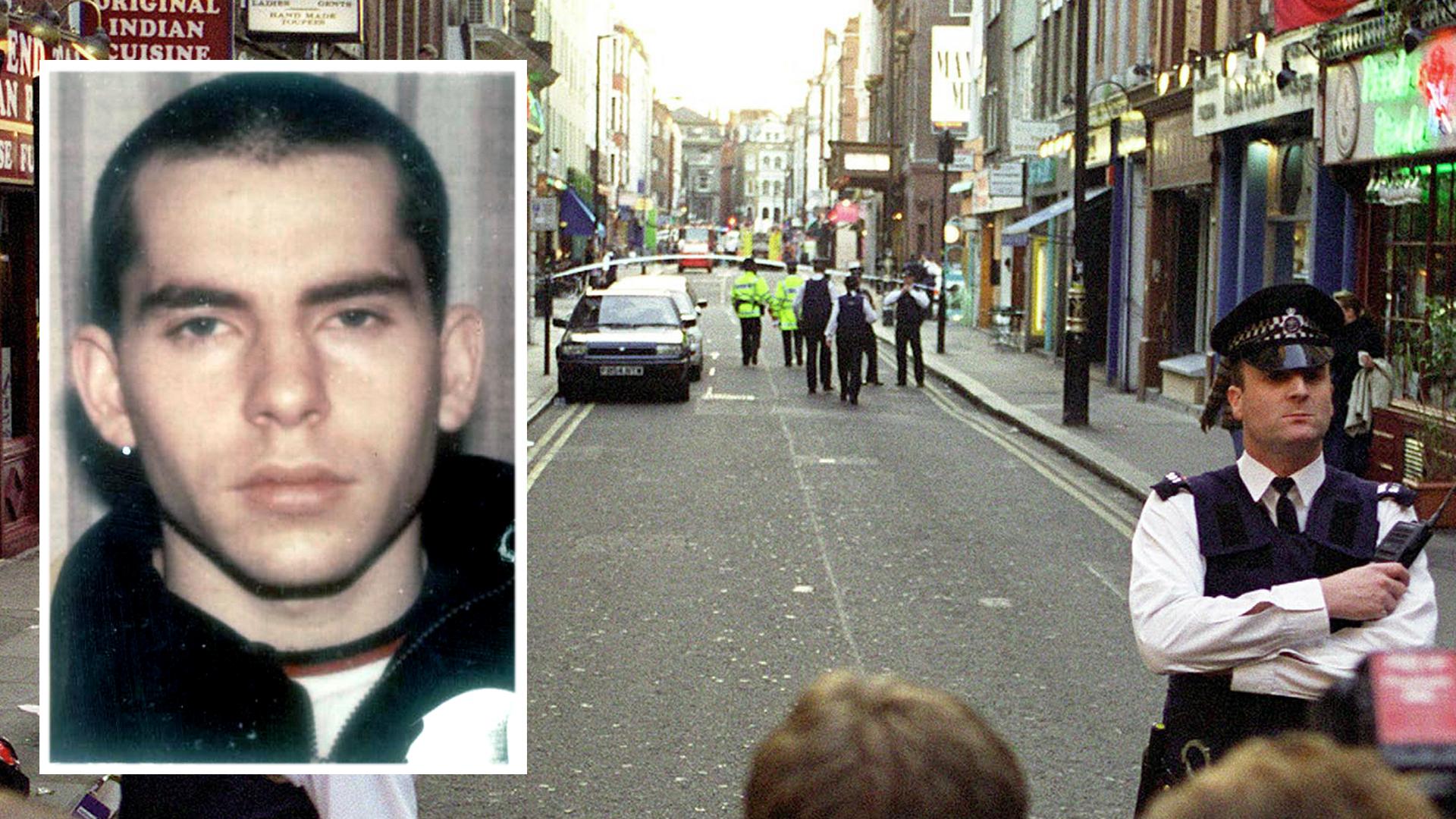
David Copeland who bombed the Admiral Duncan pub in Soho and other targets in London
The neo-Nazi threat in this country, while persistent, is not large. But it is potent in that those radicalised by its ideas have given themselves to such a violent and hateful creed that some terrorist activity will inevitably follow.
The lies espoused by the extreme right - of Aryan supremacy and global Jewish conspiracies - are out there, old ideas spread by modern means, their promoters emboldened in and by the fractious political climate.
The danger also appears to be growing, with police reporting an increase in the number of foiled far-right terror plots - five since March 2017 - and the murder of Jo Cox and the Finsbury Park vehicle attack clear evidence of what radicalised individuals can do.
Last month, the UK's most senior counter terrorism officer, Met Assistant Commissioner Neil Basu, told MPs that around 80% of the 700 live terror investigations were focused on Islamist Jihadists, with around 20% now focused on others, including a "significant number of right-wing ideological threats".
In the wake of the terrorist attacks in the UK last year, an official review recommended an increased role for MI5 in tackling extreme right-wing terrorism, with the aim being to ensure equivalence in how terrorism is dealt with, irrespective of the ideology that inspires it.
Implementation of the recommendation has started, with the security service beginning to take the lead for an area that has previously been the preserve of the police.
All images subject to copyright